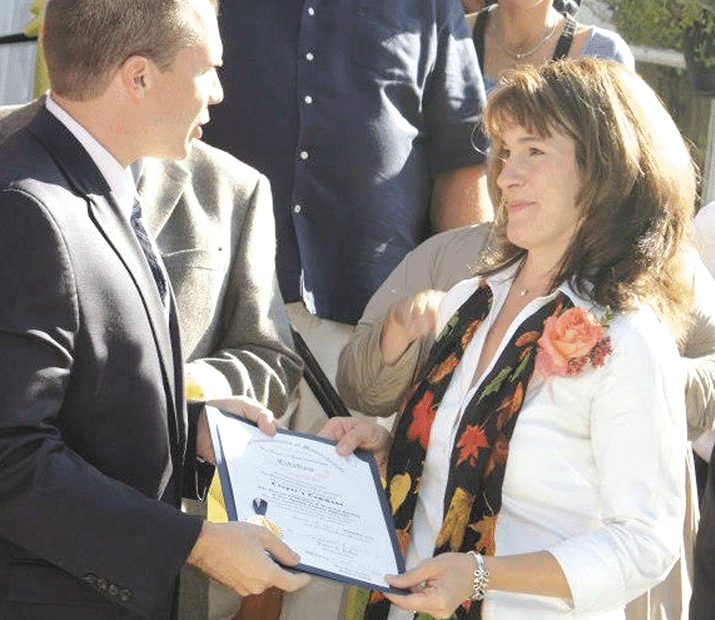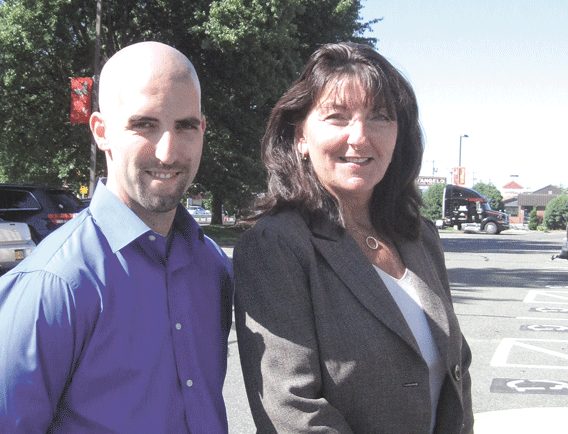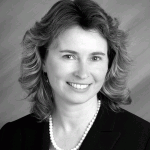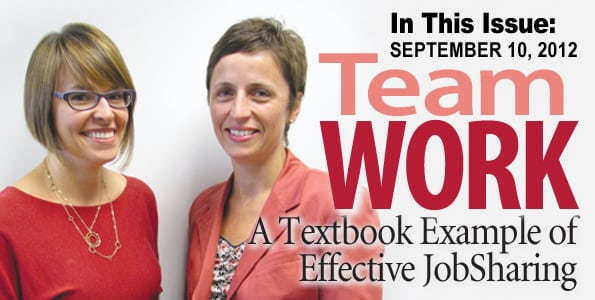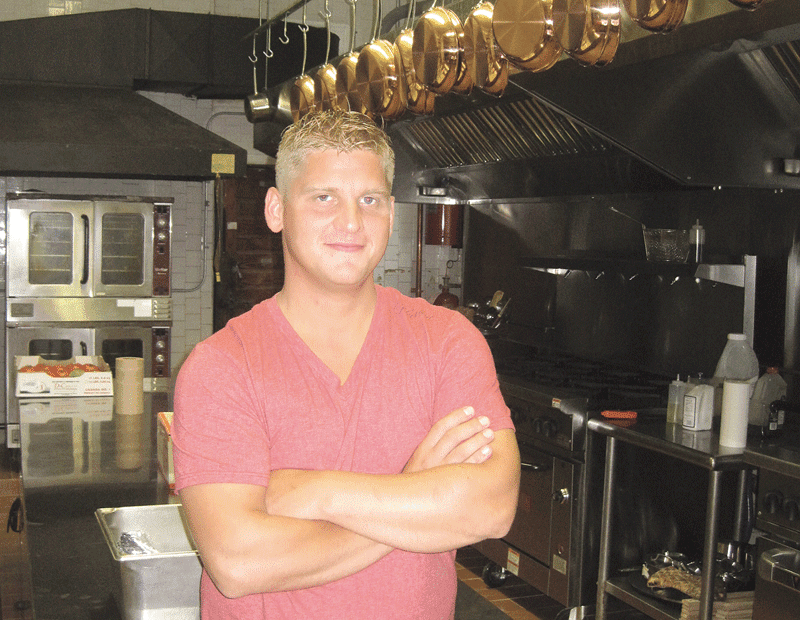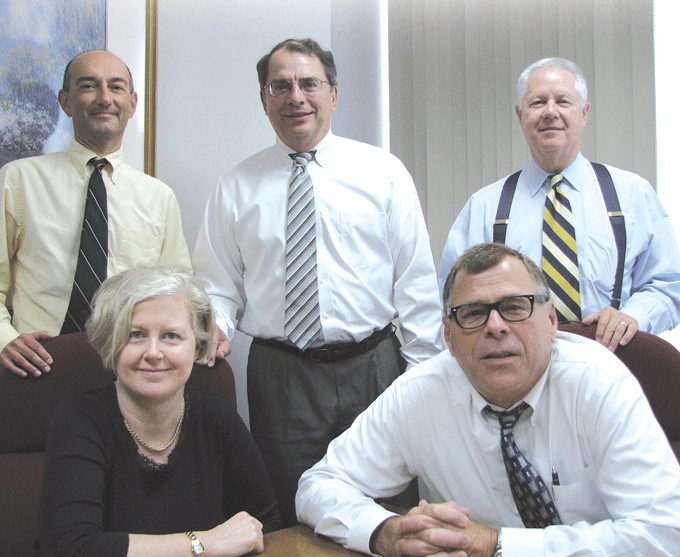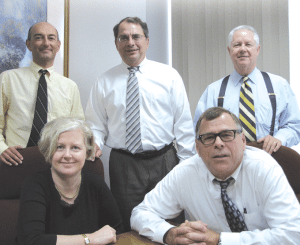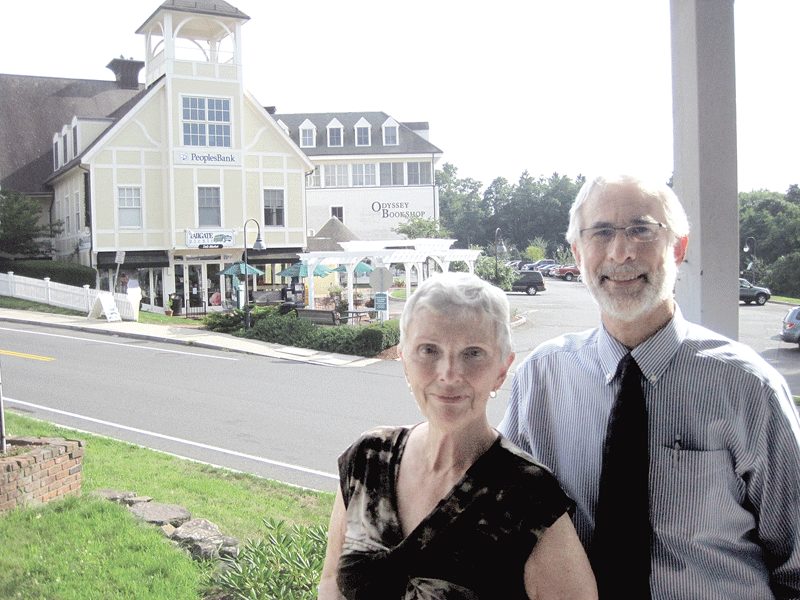Year: 2012
Send photos with a caption and contact information to: ‘Picture This’ c/o BusinessWest Magazine, 1441 Main Street, Springfield, MA 01103 or to [email protected]
Swing of Support



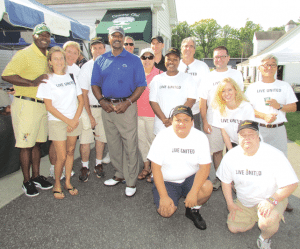 The YMCA of Greater Springfield recently honored a longtime community supporter, David Demos, and welcomed sports celebrities to the 20th Annual Scantic Valley YMCA Golf Outing. The event was held at both the Country Club of Wilbraham and the new Cold Springs Country Club in Belchertown. From top, Kirk Smith, YMCA president and CEO; Jules Gaudreau of the Gaudreau Group and a corporate board member; Demos, honorary co-chair; Jim Rice, Red Sox Hall of Famer; and “Coach” Willie Maye of the Boston Celtics. At top: Chris Ott (left), YMCA personal trainer, and Paul McConnell, YMCA member, wait their turn on the greens. Smith (center) stands with Barry and Kim Sanborn of ProShred. Maye (far left) and Rice (center) pose with Day of Caring volunteers from MassMutual.
The YMCA of Greater Springfield recently honored a longtime community supporter, David Demos, and welcomed sports celebrities to the 20th Annual Scantic Valley YMCA Golf Outing. The event was held at both the Country Club of Wilbraham and the new Cold Springs Country Club in Belchertown. From top, Kirk Smith, YMCA president and CEO; Jules Gaudreau of the Gaudreau Group and a corporate board member; Demos, honorary co-chair; Jim Rice, Red Sox Hall of Famer; and “Coach” Willie Maye of the Boston Celtics. At top: Chris Ott (left), YMCA personal trainer, and Paul McConnell, YMCA member, wait their turn on the greens. Smith (center) stands with Barry and Kim Sanborn of ProShred. Maye (far left) and Rice (center) pose with Day of Caring volunteers from MassMutual.
Common Ground

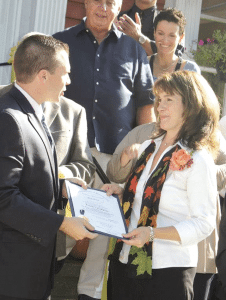 The historic Cooper’s Commons in Agawam recently celebrated the grand opening of a new marketplace of distinctive shops and services. The complex contains Cooper’s Gifts & Curtains and unique businesses in the former Country Squire Furniture Shop. The recent renovations complete phase 1 of two phases; phase 2 is expected to be completed in 2013. Surrounded by area supporters at the ribbon-cutting ceremony, above center, is Agawam Mayor Richard Cohen, and to his right is Kate Gourde, second-generation owner of Cooper’s Commons and Cooper’s Gifts and Curtains. Right, state representative Nick Boldyga, 3rd Hampden District, presents Gourde with a proclamation from the State House.
The historic Cooper’s Commons in Agawam recently celebrated the grand opening of a new marketplace of distinctive shops and services. The complex contains Cooper’s Gifts & Curtains and unique businesses in the former Country Squire Furniture Shop. The recent renovations complete phase 1 of two phases; phase 2 is expected to be completed in 2013. Surrounded by area supporters at the ribbon-cutting ceremony, above center, is Agawam Mayor Richard Cohen, and to his right is Kate Gourde, second-generation owner of Cooper’s Commons and Cooper’s Gifts and Curtains. Right, state representative Nick Boldyga, 3rd Hampden District, presents Gourde with a proclamation from the State House.
Family Business
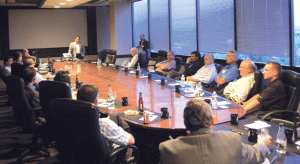 Meyers Brothers Kalicka, P.C. recently invited Dr. Michael Klein to speak to a group of family-business owners as part of an educational family-business event. Klein, at left at the head of the conference table, authored the recently published book, Trapped in the Family Business.
Meyers Brothers Kalicka, P.C. recently invited Dr. Michael Klein to speak to a group of family-business owners as part of an educational family-business event. Klein, at left at the head of the conference table, authored the recently published book, Trapped in the Family Business.
West of the River Chamber Taps into Youth
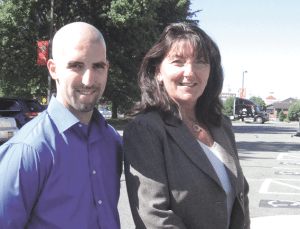
Michael Beaudry and Debra Boronski are completing the first year of a new management arrangement that saves the WRC a significant amount of administrative expenses.
Specifically, Pizzichemi, vice president of the Welcome Group Inc., which manages the West Springfield Hampton Inn and the Springfield/Enfield Holiday Inn, has passed the chairmanship of the West of the River Chamber of Commerce (WRC), to 32-year-old Michael Beaudry, owner of Azon Liquors and TEG Business Consulting, a small marketing and branding company that focuses on social networking, both in Agawam.
Pizzichemi is proud of his past year helming the WRC, the business organization that serves West Springfield and Agawam — the towns directly west of the Connecticut River — characterizing his tenure as the start as a new way of operating (more on that later). But he’s cognizant of the need to keep a membership-based business organization interesting, active, and, most importantly, growing. With technology radically altering the various ways of communicating and doing business, the board felt strongly that a shot of youthful energy was necessary.
“We went in [to a new era of the chamber] with eyes wide open, knowing that we needed to address younger business officers on the board, and we did that primarily by asking Mike to be the chairman this year,” said Pizzichemi. “The fact that he owns two small businesses, it’s really helped us expand our horizons to not be the typical stale chamber, but to be a vibrant new chamber that focuses on young, new people and young, new businesses.”
Beaudry represents the demographic that the chamber needs to pay attention to, added Debra Boronski, the new executive director of the WRC, who also runs the Massachusetts Chamber of Commerce (again, more on that later). “And that is why, at our recent annual meeting, we had a speaker who talked about how each generation works with, and needs to work with, each other in the workplace.”
One of Beaudry’s first goals will be an overhaul of the chamber’s website, which he says will be user-friendly — offering the ability to purchase event or program tickets online, and providing a broad interactive forum for members, as opposed to a static, administratively managed blog — in addition to more Facebook and Twitter outreach.
While other chambers — not just in the Western Mass. region, but across the nation — are wringing their hands, wondering what they are going to do about their aging membership, and how they should appeal to that younger population that’s necessary for their survival, the WRC is actively creating events and programming that appear to be attracting that target audience, while retaining current businesses.
With catchy new names for networking programs — ‘Wicked Wednesdays’ instead of the typical ‘After 5’ event, for instance — and more attention to business advocacy, the WRC is healthy and growing, and not a moment too soon.
For this edition of Getting Down to Business, BusinessWest sat down with the past and present chairmen of the West of the River Chamber, as well as the relatively new executive director, who have all ridden out a recent storm of uncertainty that could have spelled the end of the WRC.
At a Crossroads
“This chamber finished last year with more members than it started with,” Boronski proudly stated.
In any chamber’s book, that would be a success, but it’s especially gratifying for this group, considering its recent turmoil. About two years ago, faced with a monthly management-fee increase request by the Affiliated Chambers of Commerce of Greater Springfield (ACCGS), which oversaw the administrative and event duties of the WRC, the board felt there was a need for an economical solution that wouldn’t continue to eat away at the bottom line.
“We were at a crossroads, where they asked us to contribute more money, and we just couldn’t see it; our board of directors formed a subcommittee to determine if there were any alternatives, because we literally had no idea if there was any alternative,” explained Pizzichemi.
The answer was to offer a unique deal to Boronski, who had been vice president of the ACCGS for 11 years and in 2008 founded, and remains president of, the Massachusetts Chamber of Commerce, a statewide chamber which provides discount business benefits, but more importantly provides businesses a presence on every legislative level across the Commonwealth. The deal enabled Boronski to handle day-to-day WRC affairs as executive director, at a significantly reduced cost.
“Local chambers of commerce are looking at more effective ways to use their resources to better serve their members,” she said. “That’s how progressive this chamber is; they partnered with me and are using their member resources to provide services and products as opposed to paying rent, insurance premiums, and high salaries.”
Now, for the same $300 member fee plus $4 per employee (the creation of a ‘micro-business’ dues level for sole proprietorships is being discussed), which Pizzichemi said hasn’t been raised in four years, members not only receive the benefits of the WRC — including discounted or free consultation services, networking events, and business representation with both towns’ municipalities — but also reap all of the Massachusetts Chamber benefits.
Initially, the migration away from the ACCGS and the new managerial change were confusing to some members who left the chamber, thinking they had been members of the ACCGS, not the WRC.
“Some left because they thought that the ACCGS was a chamber, but it’s really a management organization, and they were members of the WRC all along, so the numbers dipped from 217 to 177 at one point. But we’re back up there,” Boronski explained, noting that the WRC surpassed its former peak last year, with 234 members.
Share the Wealth
As the WRC sorted out its new position as a standalone chamber with no bricks-and-mortar central office, it relied on old-fashioned teamwork and launched a mission to appeal to a younger audience while offering business advocacy and a set schedule of more events.
Boronski pointed to ‘Business with Bacon,’ which offers “breakfast with sizzling-hot topics,” which caused all to laugh — but the underlying feeling is that, be it funny, cute, or catchy … it’s working.
“We are getting members to come out for those and network, and our Wicked Wednesdays are attracting 50 to 70 people and that’s a strong showing,” said Beaudry.
But two years ago, there weren’t many events at all, Boronski said. “We’ve really made it a mission to have set schedules for purely networking events. In fact, the tag line for Wicked Wednesdays is ‘no cost, no agenda, no program, no kidding.’ That’s what small businesses need, to network and meet with people with no agenda other than that.”
“And,” Pizzichemi added, “the ability to offer real substance in the form of education and business support.”
He and Beaudry counted on their fingers the amount of money given out by the WRC in the form of grants. Six grants for $500 apiece were awarded a few years ago to member businesses for advertising assistance, and recently, four $1,000 business grants were awarded to help businesses with educational costs.
“For example, one of our auto-dealership repair services was awarded a grant to further the education of one of his technicians,” Pizzichemi said.
Another recent win for both the WRC and Agawam was the chamber’s advocacy for modifications to the business personal tax valuation that were ultimately passed, resulting in lowered taxes for hundreds of businesses. Other big hits include the recent approval of two solar-power developments (by Rivermoor Energy/Citizen’s Energy) for H.P. Hood and the town of Agawam, support for Costco’s liquor-store license and expansion, and the encouragement of a new economic-development administrator in West Springfield, which resulted in the recent hiring of Michele Cabral.
The three also point to the creation of the Agawam Small Business Assistance Center (ASBAC), which was initially funded by the town of Agawam but is now funded by the WRC. From the basics of Excel and QuickBooks to the ins and outs of social-media marketing, the ASBAC provides monthly educational seminars that help startup business members.
Next up for the WRC is the high-profile 6th Annual Food Fest West on Nov. 1 at Crestview Country Club. Pizzichemi anticipates almost 20 restaurants and more than 300 attendees.
“In a climate where almost every restaurant is overshadowed by franchises — certainly Riverdale Street in West Springfield is home to many — this elegant event celebrates our dining quality, but we do let the franchises in,” Pizzichemi said.
Along with the annual summer golf tournament and the hosting of candidate forums for local political races, ‘Coffee with the Mayor’ programs — open forum where members may converse with new West Springfield Mayor Gregory Neffinger and Agawam Mayor Richard Cohen — began this spring and have been well-received by members, said Beaudry.
As he takes charge, Beaudry’s goal is to achieve a constant flow of new, young businesses and retention of longtime members. Tapping his social-media knowledge, Boronski’s experience, and what he knows his generation needs to succeed in business, he and the companies that make up the WRC may just make this body’s transitional years a model for other chambers.
Elizabeth Taras can be reached at [email protected]
When to Classify People as Independent Contractors
Employers beware. Hiring people as ‘independent contractors’ may provide a competitive advantage that seems tempting. However, the risks of misclassifying employees as independent contractors may far outweigh the benefits.
By classifying a worker as an independent contractor rather than an employee, a business may reap certain advantages. For example, the business may not be held vicariously liable to third parties in court for the negligent acts of an independent contractor as it would for an employee. The business may also avoid paying payroll tax, including the Federal Insurance Contribution Act (FICA) and Federal Unemployment Tax Act (FUTA), and also avoid payments toward state unemployment and workers’ compensation insurance. The business may also save substantial costs by not having to enroll the individual in any employee-benefit plans.
Unfortunately, the use of independent contractors carries with it the inherent risk that the federal or state government will determine that a business should have treated a particular person, or class of persons, as employees for tax, wage-hour, unemployment, workers’ compensation, or employee-benefit-plan purposes. To avoid running afoul of state and federal law regarding misclassification of workers, businesses need to examine their independent-contractor relationships, understand the risks, and consider taking appropriate steps to reclassify or restructure their relationships with these individuals.
In determining whether an individual is an employee or an independent contractor, the most important factor is the employer’s right to direction and control over the individual. The more direction and control that the employer has, the more likely it is that the individual will be deemed to be an employee. Some of the factors to consider are whether the employer sets hours, provides an office and equipment, and gives instructions on how to perform tasks as opposed to the individual making his or her own schedule, being self-directed, and furnishing his or her own equipment and supplies. This is the test that has traditionally been applied by the IRS to determine whether a worker is an employee or independent contractor for federal employment-tax purposes.
Many states, including Massachusetts, apply different tests for determining a worker’s status. The Massachusetts Independent Contractor Law (MICL) is among the strictest in the country and creates a presumption that an individual performing any service is an employee. To overcome this presumption, the party receiving services must establish that:
• The worker is free from its control and direction in performing this service, both under a contract and in fact;
• The service provided by the worker is outside the employer’s usual course of business; and
• The worker is customarily engaged in an independent trade, occupation, profession, or business of the same type.
The first part of the test looks at the degree of control and direction retained by the employer over the services performed by the individual. It is the employer’s burden to demonstrate that the services at issue are performed free from its direction or control and carried out with minimal instruction. An independent contractor completes the job using his or her own approach with little direction and dictates the hours that he or she will work on the job.
The second part of the test requires that the service the individual performs be “outside the usual course of business of the employer.” This requirement impacts any business that hires independent contractors to supplement its regular workforce. In 2003, for example, the Supreme Judicial Court of Massachusetts found that a newspaper had misclassified its newspaper carriers as independent contractors when the carriers were performing the usual course of business of the newspaper.
The third part of the test requires that the individual be customarily engaged in an independently established trade, occupation, profession, or a business of the same nature as that involved in the service performed. In other words, is the worker wearing the hat of an employee of the employing company, or is he or she wearing the hat of his or her own independent enterprise? This requirement may be difficult to satisfy if the independent contractor works only for one company.
The MICL is enforced by the Fair Labor Division of the Office of the Attorney General of the Commonwealth. The Attorney General’s 2008 advisory concerning the MICL states that an employer’s failure to withhold taxes, contribute to unemployment compensation, or provide workers’ compensation for an individual is not considered when analyzing whether an employee has been misclassified. Nor is the existence of an independent-contractor agreement (although, according to the attorney general, the MICL requires that all independent-contractor relationships be reflected in written agreements or job descriptions). In other words, just because an employer believes that a worker should be an independent contractor and treats that worker as such does not make it so in the eyes of the law.
The attorney general can issue civil citations and institute criminal prosecutions against businesses and individuals for both intentional and unintentional violations of the MICL. More significantly, private citizens may file civil actions in court for themselves and others similarly situated, claiming that they have been misclassified as independent contractors but are, in fact, employees entitled to all the rights and protections under the Massachusetts Wage Act. The Wage Act is a particularly potent weapon since it imposes personal liability on officers and managers of companies who violate its provisions, including the MICL. In addition, the 2008 amendments to the Wage Act require a court to award treble (three times) damages plus attorney’s fees and costs to an employee who prevails on his or her claim.
Misclassifying employees as independent contractors may also subject a business to:
• Income-tax liability for monies that should have been withheld from the ‘wages’ of the ‘employees’;
• Employer FICA and FUTA contributions;
• Potential overtime pay and other wage claim liability;
• State unemployment-insurance payments;
• Workers’ compensation insurance premiums and potential liability for workplace injuries; and
• Other civil and criminal liability. Additionally, workers may be entitled to coverage and benefits under existing employee benefit plans.
There are several approaches a business can take to address these risks. It might:
• Evaluate relationships with independent contractors to determine whether the classification is proper under the MICL three-part test;
• Review all written independent-contractor agreements and modify them where appropriate;
• Ensure that all independent-contractor relationships are reflected in written agreements or job descriptions correctly describing the relationship and the party’s respective obligations;
• Begin treating misclassified independent contractors as employees; and
• Maintain independent-contractor relationships but take steps to limit potential exposure (for example, ensure that no independent contractor works more than 40 hours per week so that the business does not face potential overtime liability).
Keith A. Minoff is a Springfield-based attorney specializing in employment law and business litigation; (413) 301-0866.
New incorporations filed with the Mass. Secretary of State’s office were not available at press time. They will be printed in the next issue of BusinessWest.
Photographers Click at Westfield State
Through Oct. 20: Westfield State University’s Arno Maris Campus Gallery is hosting “Through the Iris, the Photographic Perspective,” an exhibit featuring the work of local photographers Betsy Feick, Elizabeth Garcia, Bill Hughes, and Dan Minicucci. Feick’s collection, “The Meadows,” highlights local rustic scenery from Northampton. “My specialized infrared camera captures a part of the light spectrum invisible to our human eyes,” she said. “My slightly distorting wide-angle lenses put the viewer right in the picture and add an unearthly quality to the photos.” Garcia’s “Nebulous” is an abstract collection of photographs described as “science fiction-like.” There is a lack of clarity in terms of what subject matter the images are conveying and a slight level of confusion about how they were conceived. The collection “has cohesively morphed my visual aesthetics in painting and photography into an abstract world of suspension,” she said. “The ability to initiate imagination and pondering in the minds of others is an admirable gift that inspires me and sustains my intrinsic visual engagement as an artist and viewer.” Meanwhile, Hughes’ “Dream Sketches,” she said, “are pictures which explore visual possibilities that may exist when time, space, and motion are allowed to accumulate through the lens of a camera and be recorded. Finally, Minicucci’s photos reflect the more than 15 years he has spent documenting the flora, fauna, and scenery of the Westfield River Watershed. There will be an artist’s reception on Oct. 4 from 5:30 to 8 p.m., with live music and refreshments. Normal gallery hours are Tuesday through Friday, 2 to 5 p.m.; Thursday, 2 to 7 p.m.; and Saturday, 1 to 5 p.m. The gallery is located in WSU’s Ely Campus Center.
World Affairs Council Annual Meeting
Oct. 10: Hampshire College President Jonathan Lash will speak at the World Affairs Council of Western Mass. Annual Meeting & Dinner in the Mahogany Room of the Springfield Sheraton Hotel in downtown Springfield. More details will be forthcoming. Lash is an internationally recognized expert on practical solutions to global sustainability and development challenges. Before he became president of Hampshire College in 2011, he served as president of World Resources Institute (WRI), an environmental think tank with offices in eight countries and partners in more than 50 countries. WRI is an international leader on issues ranging from low-carbon development to sustainable transportation. From 1993 to 1999, Lash was co-chair of the President’s Council on Sustainable Development, a group of government, business, labor, civil-rights, and environmental leaders appointed by Bill Clinton that developed visionary recommendations for strategies to promote sustainable development. He played a key role in the creation and success of the U.S. Climate Action Partnership, which in 2007 issued the highly influential “Call to Action” on global warming. Prior to WRI, Lash held posts as director of Vermont Law School’s Environmental Law Center, Vermont secretary of Natural Resources, and Vermont commissioner of Environmental Conservation, as well as a federal prosecutor. For more information on the event, call (413) 733-0110.
Brown, Warren to Debate
Oct. 10: Massachusetts citizens will soon cast ballots for U.S. senator in a nationally followed race. On behalf of the Western Mass. U.S. Senate Debate Consortium, the Springfield Public Forum will serve as coordinator of one of the debates between Republican Sen. Scott Brown and Democratic challenger Elizabeth Warren. Slated for Symphony Hall, this will be the only debate between the candidates held in Western Mass. Tickets are required, but are free and available on a first-come, first-served basis at various locations in the area, including the Economic Development Council, 1441 Main St., Springfield, as well as from event partners Mass Live, New England Public Radio, the Daily Hampshire Gazette, the Republican, UMass Amherst, the Amherst Valley Press Club, Western New England University, WGBY, WGGB (abc40 and Fox 6), WSHM (CBS 3), and WWLP (NBC 22). Tickets are general admission only.
Western Mass.
Business Expo
Oct. 11: BusinessWest will again present the Western Mass. Business Expo. The event, which made its debut last fall at the MassMutual Center in downtown Springfield, will feature more than 180 exhibitors, seminars, special presentations, breakfast and lunch programs, and the year’s most extensive networking opportunity. Comcast Business Class will again be the presenting sponsor of the event. Details, including breakfast and lunch agendas, seminar topics, and featured speakers, will be printed in the pages of BusinessWest over the coming months. For more information or to purchase a booth, call (413) 781-8600, e-mail [email protected], or visit www.wmbexpo.com.
Novelist, Playwright to Speak at STCC
Oct. 12: Andrea Hairston, novelist and playwright, will visit the region as part of the Ovations series, sponsored by the Chicopee Savings Bank Endowment for Academic Excellence, the STCC Office of Academic Affairs, and the STCC Honors Program. There will two performances, at 10:10 and 11:15 a.m., in Scibelli Hall. Both are free and open to the public. Hairston is the Artistic Director of Chrysalis Theatre. For more than 30 years, Hairston has created original music, dance, and mask productions. In 1997, Hairston turned her interest to science fiction and wrote a sci-fi theatre jam, Archangels of Funk. She also published her first sci-fi novel, Mindscape, which won the Carl Brandon Parallax Award. Tony Award winning playwright Pearl Cleage said, “Andrea Hairston’s Mindscape starts with a vision of the way things ought to be and then takes us along on the amazing journey that must be undertaken to make that vision a reality.” Hairston has spent her career exploring the links between arts and science. This multi-faceted presentation will feature readings, music, and performance. For additional information about the Ovations series, contact Philip O’Donoghue at (413) 755-4233 or [email protected].
An Evening of
Classical Music
Oct. 19: The New England Farm Workers’ Council, the North End Educational Development Fund, the Student Prince & Fort Restaurant, and the Puerto Rican/Latino Leadership Council will present “Diversecity,” an evening at Springfield’s Symphony Hall with the internationally renowned Puerto Rico Philharmonic Orchestra, featuring 70 musicians and guest singers. The symphony will be conducted by Maestro Rafael Enrique Irizarry III, with special guest Kevin Rhodes. The event, starting at 7:30 p.m. and hosted by Bax & O’Brien of Rock 102, is intended to bring local residents together in celebration of the strength, diversity, and cultural richness of this region and its people. Tickets may be purchased at symphonyhall.com or ticketmaster.com.
Writer, Essayist to Speak
Nov. 5: Anne Fadiman, a writer, essayist, and author whose first book, The Spirit Catches You and You Fall Down, won her a National Critics Book Circle Award, will visit the region as part of the Ovations series, sponsored by the Chicopee Savings Bank Endowment for Academic Excellence, the STCC Office of Academic Affairs, and the STCC Honors Program. There will two performances, at 10:10 and 11:15 a.m., in Scibelli Hall. Both are free and open to the public. The Washington Post called Fadiman’s book “an intriguing, spirit-lifting, extraordinary exploration.” The Spirit Catches You and You Fall Down tells the story of Lia Lee, the daughter of Hmong immigrants from Laos, who was diagnosed with epilepsy in 1981. What follows is the story of a clash of cultures as well as an examination of the U.S. healthcare system. The book is often taught in university literary journalism courses across the country and serves as a casebook for cross-cultural sensitivity. Fadiman also is the author of Ex Libris: Confessions of a Common Reader and At Large and At Small: Familiar Essays. She currently resides in Whately and is a professor of English and writing mentor at Yale University. For additional information about the Ovations series, contact Philip O’Donoghue at (413) 755-4233 or [email protected].
40 Under Forty Reunion
Nov. 8: BusinessWest will stage a reunion featuring the first six classes of its 40 Under Forty program. Details on the event will be forthcoming. What is known is that it will be staged at the Log Cabin Banquet & Meeting House in Holyoke, and will be open only to 40 Under Forty winners, sponsors, and their guests, as well as judges of the first six contests. For more information on the event, call (413) 781-8600, or e-mail [email protected].
The following building permits were issued during the month of September 2012.
AGAWAM
Benchmark Senior
153 Cardinal Dr.
$8,000 — Repair water damage
Mr. Shower
646 Springfield St.
$50,000 — New roof
AMHERST
Amherst Montessori School
27 Pomeroy Lane
$2,092,000 — Construction of a two-story addition
Filion Leasing Inc.
150 College St.
$10,000 — New roof
Jones Library Inc.
43 Amity St.
$108,000 — Install new flooring, ceiling tiles, and lighting in the Woodbury Room
Northland Boulders, LLC
188 East Hadley Road
$116,000 — New roof
Town of Amherst Recreation
205 Triangle St.
$298,000 — Pool repairs and upgrades
CHICOPEE
Demayo-Chicopee Square, LLC
516 Montgomery St.
$38,000 — HVAC duct system
John Rusin
16 Bolduc Lane
$6,000 — Interior renovation at the Den
EASTHAMPTON
Bernard Gawle
90 Union St.
$37,000 — New roof
City of Easthampton
Lovefield St.
$10,000 — New roof
The Phillips Manufacturing Co.
17 Ward Ave.
$21,000 — New roof
HOLYOKE
92 Race Street, LLC
92 Race St.
$710,000 — Interior renovations
Holyoke Mall Company, LP
50 Holyoke St.
$323,000 — Renovate Old Navy store
Michael Ciolek S-H-R Trust
494 Appleton St.
$306,000 — Construct new masonry walls
NORTHAMPTON
Bridge Street LLC
82 Bridge St.
$10,500 — Exterior repairs
Smith College
12 Bedford Terrace
$4,000 — Repair porch
Smith College
50 Elm St.
$22,000 — Exterior repairs at Clark Hall
SOUTH HADLEY
Northeastern Sheet Metal
50 College St.
$58,000 — Sheet-metal work
SPRINGFIELD
A.I.C.
125 Cartland St.
$30,000 — Build three offices
Derf Realty
170 Carando Dr.
$120,000 — Renovate 2,800 square feet to expand existing tenant
John Salema
1218 State St.
$55,000 — Interior cosmetic renovation to office space
No Limit Investment Inc.
489-493 Worthington St.
$8,500 — Exterior renovation
Sanjay Patel
182 Boston Road
$106,000 — 1,860 square feet of space added to existing building
Walmart
1105 Boston Road
$500,000 — Install solar array on existing roof
WEST SPRINGFIELD
Balise Automotive
635 Riverdale St.
$10,000 — Remodel restrooms
Lattitude Realty, LLC
1338 Memorial Ave.
$200,000 — Renovate 2,600 square feet of commercial space
Big Y Relaunches Education Express
WILBRAHAM — Citing a passion for education and a belief that strong schools build strong communities Big Y World Class Markets recently announced the return of the Big Y Education Express Program beginning Oct. 4. Through the program, shoppers help schools receive supplies such as new computers, software, books, math and science materials, sports equipment, and other items. Shoppers can sign up to support the school of their choice beginning Sept. 6, and points will accumulate from Oct. 4 through Jan. 1, 2014. Sign up is available online at bigy.com/educationexpress, through Facebook, or by filling out a form at the customer-service desk or any register at a Big Y store. When shoppers purchase participating products, marked with a school-bus logo on the shelf sign, and present their Big Y Express Savings Club or Silver Savings Club card, they earn points for the school of their choice. Schools can then redeem the points for free educational supplies. Customers can track individual contributions online, and schools receive point updates weekly and can redeem points at any time during the program. Since 1993, Education Express has awarded more than $13 million worth of teaching materials and classroom equipment to more than 2,000 schools in Big Y’s market area.
HCC Foundation Awarded Grant
HOLYOKE — The Holyoke Community College Foundation has been awarded a $200,000 grant from Urban Research Park CDE, LLC, to launch a technology career pathways program in partnership with Dean Technical High School and the Massachusetts Green High Performance Computing Center (MGHPCC). The collaborative project, called Career Pathways in Technology for Holyoke, is designed to enhance technology education for Holyoke and area residents by establishing a CISCO Academy at HCC and Dean Tech while leveraging educational opportunities through the MGHPCC. CISCO, a corporate sponsor of the MGHPCC, licenses its CISCO Academy curriculum to offer training and professional certifications in the latest technology to help prepare students to fill the global demand for networking professionals. The three-year grant will serve at least 150 students, 25 a year at Dean and 25 a year at HCC. Classes are expected to begin in January 2013, with the program in full operation at both Dean and HCC by September 2013. Career Pathways in Technology for Holyoke will offer both non-credit and credit courses. Non-credit courses will offer certifications that can lead to job placement and are expected to serve the region’s current workers seeking entry-level jobs or job advancement. Dean students will also have the opportunity to enroll in credit classes at HCC in Computer Information Systems to obtain a certificate or associate degree. “One of the goals is to create an educational pathway from Dean Tech to both the credit and non-credit opportunities available at HCC and ultimately into the workforce or toward further educational opportunities,” said Jeffrey Hayden, vice president for Business and Community Service at HCC.
Impressions Academy of Dance Performs at WDW
FEEDING HILLS — Members of The Impressions Academy of Dance recently traveled to Downtown Disney at Walt Disney World Resort in Florida to take part in a Disney Performing Arts Program. Dance groups, choirs, ensembles, and marching bands from around the world apply to perform each year as part of Disney Performing Arts at both Disneyland in California and Walt Disney World. Once selected, groups are given the opportunity to perform at the resort for an international audience of theme-park guests. Millions of performers have graced the stages of the Disney parks in the more-than-25-year history of the program. Disney Performing Arts offers band, choral, dance, and auxiliary performers the opportunity to learn, perform, and compete at the Disney World resort.
Springfield College Ranked by Magazine
SPRINGFIELD — Springfield College was recently ranked in the top tier of the Best Regional Universities – North Region category in U.S. News & World Report’s 2013 edition of “Best Colleges.” The ratings are based on such variables as peer assessment, graduation and retention rates, student selectivity, class size, alumni giving, and student-faculty ratio. “We take pride in this recognition,” said SC President Richard Flynn. “Springfield College is committed not only to academic excellence, but to providing an affordable private education. This latest ranking again confirms that our outstanding faculty and staff remain committed to providing a top-notch education for our students.”
Tighe & Bond Awards Scholarships
WESTFIELD — Through the Community Foundation of Western Massachusetts, Tighe & Bond Inc. recently awarded its yearly scholarships to three local college students pursuing engineering degrees. According to David Pinsky, president of the civil- and environmental-engineering firm, “Tighe & Bond firmly believes in the importance of higher education for promising students who have the desire to pursue degrees in engineering. It also offers us a tangible way to support the future of the engineering practice which is essential to problem solving and the well-being of our society.”
Recipients include Johnniel Gomez, a 2012 graduate of Roger L. Putnam Vocational High School, who will attend UMass Dartmouth and study Civil Engineering and received the Philip W. Sheridan – Tighe & Bond Scholarship; Jason Arble, a 2012 graduate of Holyoke High School, who plans to study Electrical Engineering at UMass Amherst and is the recipient of the Edward J. Bayon Memorial Scholarship; and Aaron Sabbs, a 2009 graduate of South Hadley High School, who will be a senior at Worcester Polytechnic Institute, where he is majoring in Civil Engineering, and is a recipient of the George H. McDonnell Scholarship for the fourth year running. All of the scholarships awarded are in memory of past Tighe & Bond presidents.
Winstanley Partners Revamps Race Website
LENOX — Winstanley Partners recently revamped the website for the annual Josh Billings Run Aground Triathlon, also simply known as the Josh, which occurred on Sept. 16. Founded in 1976, the race draws more than 500 teams, from weekend warriors to full-fledged Ironmen and Ironwomen, who converge at the Stockbridge Bowl with bicycles, kayaks or canoes, and running shoes. Phil Cohen, project manager at Winstanley Partners, explained that the agency worked in tandem with Race Director Patty Spector to switch joshbillings.com over to the WordPress content-management system, which makes additions and updates simpler and allows race coordinators and the all-volunteer staff to revise information throughout the year. The new site will also keep race enthusiasts informed and attract more athletes and spectators who routinely check race locations, routes, and results.
STCC, Eastern States Exposition Partner on Internship Program
SPRINGFIELD — Springfield Technical Community College (STCC) and the Eastern States Exposition (ESE) recently announced a scholarship that creates internship opportunities for STCC students in the Civil Engineering Technology program. Through a donation from Eastern States Exposition, the college created the STCC Civil Engineering Excellence Fund this past June to support a Civil Engineering Learning Laboratory at the exposition facilities. The laboratory will provide STCC students with the opportunity to apply classroom skills outside the campus in a working environment. The partnership between STCC and the ESE will provide a unique learning opportunity to STCC students. Selected interns will receive a scholarship and be recognized at the annual STCC scholarship and awards ceremony. Students will develop project organization, management, and communication plans; catalog, review, and digitally archive historical blueprints and engineering documents; interview and gather facility development history; locate the exposition site’s structural, sewer, electrical, and roadway systems; provide updated digital schematics and renderings of the site using industry-standard software; and recommend areas for consideration for future analysis and verification. “It’s a unique opportunity for our students because it allows them to have a historical perspective of what they are working on,” said STCC Foundation Interim Director Robert LePage. “It’s a really great hands-on learning experience.” STCC student Carlos Cruz is the first student to participate in the program and began work this summer. Under the supervision of STCC Adjunct Professor of Civil Engineering Technology Robert Vetrano, Cruz already has scanned more than 600 of the exposition’s drawings, converted them into TIF format, cleaned the images, and finally converted them into PDF format. Next summer, LePage said he hopes to have at least three or four additional interns to help with the project, and credits the Eastern States Exposition with stepping forward to become the first local organization to support the scholarship program. “It’s an interesting project,” said LePage. “And it’s nice to support and partner with an organization like the Eastern States Exposition, with such a strong mission and focus on education.” LePage noted that, while the ESE is the first organization to step forward to contribute to the STCC Civil Engineering Excellence Fund, there are opportunities for other area businesses to get involved.
Colony Hills Capital Announces Acquisition
WILBRAHAM — Colony Hills Capital, LLC (CHC), a Wilbraham-based real-estate-investment firm, recently closed on the $14 million purchase of Wynthrope Forest Apartments, a 270-unit, garden-style community located in Riverdale, Ga. Wynthrope Forest, built in 2000, occupies 28 acres of land. “Because Wynthrope Forest was an REO, we were able to acquire this tremendous asset at an excellent cost basis and significantly below replacement cost,” said David Kaufman, vice president with CHC. “With minor capital improvements and instituting best-in-class management disciplines, I believe our investors will be rewarded with strong risk-adjusted returns.” CHC was joined by equity partners Plymouth Opportunity REIT and Redwood Real Estate Partners in the investment, as well as Morgan Stanley, which provided the mortgage financing on the property.
Big Y Opens Latest Store
in Franklin
SPRINGFIELD — Big Y recently opened its newest World Class Market at 348 East Central St. in Franklin. The 56,866- square-foot market boasts many new innovations both inside and outside of the store. Bowdoin Construction Corp. served as the general contractor for this location, in conjunction with several local subcontractors, such as Tom Gioloso Construction Inc., for the completion of this $14.5 million investment that began in September 2011. “All of us at Big Y are excited to offer the Franklin community with a brand-new shopping experience and a new option for their grocery and lifestyle needs,” said Big Y’s president and chief operating officer, Charles D’Amour.
AJE Financial Services Moves into New Quarters
LUDLOW — AJE Financial Services in Ludlow recently moved into new offices at 588 Center St. in Ludlow. Previously located on 364 East St. in Ludlow, the company had outgrown its former location. Owner and President Robin Wdowiak said he is pleased to be able to keep the business in town. “AJE Financial Services has been a part of the Ludlow business community for 17 years, and we are thrilled that we were able to find a suitable location right here in town,” said Wdowiak. “I grew up in Ludlow and know many of the residents here, so there is always a neighbor-helping-neighbor feeling to the services that we provide.” The company staged an open house on Sept. 6.
New incorporations filed with the Mass. Secretary of State’s office were not available at press time. They will be printed in the next issue of BusinessWest.
•••••
MassMutual Retirement Services Division recently announced the addition of Christopher Stout as Sales Director to support its growing presence in the Southeast region. Stout joined the division on Aug. 1 and will be responsible for business development and sales support of MassMutual’s third-party and dedicated distribution channels focusing on retirement plans in the small-plan market.
•••••
Tighe & Bond announced that Todd Kirton, a Senior Hydrogeologist with the firm for 17 years, has earned his Licensed Site Professional credential. Experienced in the cleanup of oil and hazardous-material contamination, he will also be responsible for developing and executing services for clients that satisfy the Mass. Department of Environmental Protection requirements.•••••
Sean West has been promoted to Manager of Ticket Sales for the Springfield Falcons, an AHL affiliate of the NHL’s Columbus Blue Jackets. West was initially hired by the Falcons as an account executive following the 2011-12 season. He will oversee the ticket department, working closely with team staff and the local community to increase both season and group ticket sales.
•••••
Suzanne Beck, Executive Director of the Greater Northampton Chamber of Commerce and the interim director for the emerging regional Hampshire County Chamber of Commerce, and the founding directors of that new organization recently announced the addition of two additional new Founding Directors:
• Molly Keegan, a Financial Planner with the Davis Financial Group of Hadley and a board member of the Amherst Area Chamber of Commerce; and • Ruth Constantine, Vice President for Finance and Administration at Smith College.Both will offer increased geographical representation as well as a voice for the area’s local chambers and its colleges and universities. The formation of the regional chamber was announced in March, and founding directors and regional organizations have invested over one-third of the $400,000 needed over two years to bring the concept to fruition.
•••••
The Sisters of Providence Health System recently named Dr. Mary Tarail Chief Medical Officer for Providence Behavioral Health Hospital. Tarail, who previously served as the Associate Medical Director of Geriatric Psychiatry at Providence, will now be responsible for the medical leadership at the facility, including the coordination of all patient care and safety, quality assessment, risk management, patient satisfaction, and improvement in health care programs, and will serve as a liaison between the medical staff and administration. Previously, Tarail served as the Inpatient Unit Chief for Geriatric Psychiatry at Mt. Sinai Hospital in New York and was also the Director of the Geriatric Psychiatry Clinic at the Bronx Veterans Administration Hospital. She is fellowship-trained in the psychiatric treatment of older adults and is sub-specialty board-certified.
•••••
FieldEddy Insurance recently appointed Michael Collura as Account Executive, Commercial Lines. Collura, a Certified Insurance Service Representative in Massachusetts, will advise new and existing clients on insurance risk-management techniques.
•••••
Hospice Services of Western Mass. announced that David McDougall, D.O. has become the Medical Director for its Feeding Hills office. McDougall graduated from the University of Osteopathic Medicine & Health Sciences in Des Moines, Iowa in 1995. His post-graduate training was done at Sisters of Charity Hospital in Buffalo, New York followed by a residency with Baystate Medical Center in Springfield. He is board-eligible in internal medicine and is a member of the Long-Term and Sub-Acute Team at Hampden County Physician Associates caring for patients in local skilled-nursing facilities.
Auction and Wine, Beer & Spirit Tasting
Sept. 13: Wine tasting is a spirited, thirst-quenching and good-natured adventure. And when it is the annual Greater Chicopee Chamber of Commerce Auction & Wine, Beer & Spirit Tasting Event, it is also a fund-raiser for a not-for-profit community resource that supports local businesses, nonprofit organizations, and the overall development of the region. Chicopee Savings Bank is the presenting sponsor of this year’s event, to be held at the Log Cabin from 6 to 9 p.m. William Wagner, president of Chicopee Savings Bank, and John Baran, station manager of WWLP-22 News, will serve as emcees. The event will include gourmet food stations. and wine, beer, and spirit samples will be available from Berkshire Brewing, Commercial Distributing, Commonwealth Wines & Spirits, Opa-Opa, V1 Vodka, and Williams Distributing. The event will also feature a silent auction, and the Eric Bascom Jazz Trio will also provide music. Tickets are $35 in advance and $40 at the door. The general public is invited. To reserve tickets, contact the chamber at (413) 594-2101 or www.chicopeechamber.org.
The Big E
Sept. 14-30: From live music and parades to sea lions and a circus, there’s something for everyone at the Big E. Country music artist Rodney Atkins will play a concert at the outdoor Comcast Arena Stage on Sept. 23 at 7:30 p.m. The Big E’s Mardi Gras Parade returns to the fair with eight custom-made floats specially designed and built by the Kern Companies of New Orleans. The Big E Super Circus features aerial daredevils the Marinofs, the wonder dogs of David Rosaire’s Perky Pekes, the equilibristic ability of Dany Daniels and Edina, comedy, and more. In addition, the Big E will feature a show with the Peking Acrobats, horse shows, the U.S. Freestyle Motocross National Championship series, hypnotist Catherine Hickland, the Sea Lion Splash show, and much more. Look for details and show times at www.thebige.com. Gates open each day at 8 a.m., and building exhibits are open 10 a.m. to 10 p.m. The Avenue of States is open 10 a.m. to 9 p.m., Storrowton Village is open 10 a.m. to 9 p.m., Craft Common is open 10 a.m. to 10 p.m., and the Midway is open Sunday through Friday, 11 a.m. to 10 p.m., and Saturdays, 10 a.m. to 11 p.m.
Reading and Book Signing
Sept. 17: Author and education advocate Jonathan Kozol will read from his latest book on at 7 p.m. in the Leslie Phillips Theater at Holyoke Community College. The event is free and open to the public. After the reading, Kozol will discuss and sign copies of Fire in the Ashes: Twenty-five Years Among the Poorest Children in America. He is an author and educational activist known for his non-fiction books on public education in inner-city schools, beginning with Death at an Early Age in 1967, which he wrote after working as a teacher in the Boston public-school system where he was fired for teaching a poem by Langston Hughes. The book won a National Book Award. In Fire in the Ashes, Kozol revisits the schools and children he first wrote about in his books Amazing Grace and Rachel and her Children. For more information, contact Liz Golen, HCC Student Activities coordinator, at (413) 552-2418 or [email protected].
‘All Souls’ Author
to Discuss Memoir
Sept. 21: As part of the Ovations series, sponsored by the Chicopee Savings Bank Endowment for Academic Excellence, the STCC Office of Academic Affairs, and the STCC Honors Program, Michael Patrick McDonald will discuss his coming-of-age memoir All Souls. There will be two performances, at 10:10 and 11:15 a.m., in Scibelli Hall. Both are free and open to the public. All Souls is an account of McDonald’s upbringing in South Boston during the turbulent 1970s. MacDonald, the ninth child in a family of 11, was raised by his mother. Four of his siblings died tragically, two of whom were associated with Whitey Bulger, the notorious crime czar of South Boston. Much of All Souls deals with the power Bulger held over South Boston and the tragic effects that had on MacDonald’s family. MacDonald will return to STCC, where he captivated the audience three years ago, to talk about Whitey Bulger and the legacy Bulger leaves behind. USA Today calls MacDonald “a born rabble-rouser whose emotional power numbs the reader’s reason.” For additional information about the Ovations series, contact Philip O’Donoghue at (413) 755-4233 or [email protected].
World Affairs Council Annual Meeting
Oct. 10: Hampshire College President Jonathan Lash will speak at the World Affairs Council of Western Mass. Annual Meeting & Dinner in the Mahogany Room of the Springfield Sheraton Hotel in downtown Springfield. More details will be forthcoming. Lash is an internationally recognized expert on practical solutions to global sustainability and development challenges. Before he became president of Hampshire College in 2011, he served as president of World Resources Institute (WRI), an environmental think tank with offices in eight countries and partners in more than 50 countries. WRI is an international leader on issues ranging from low-carbon development to sustainable transportation. From 1993 to 1999, Lash was co-chair of the President’s Council on Sustainable Development, a group of government, business, labor, civil-rights, and environmental leaders appointed by Bill Clinton that developed visionary recommendations for strategies to promote sustainable development. He played a key role in the creation and success of the U.S. Climate Action Partnership, which in 2007 issued the highly influential “Call to Action” on global warming. Prior to WRI, Lash held posts as director of Vermont Law School’s Environmental Law Center, Vermont secretary of Natural Resources, and Vermont commissioner of Environmental Conservation, as well as a federal prosecutor. For more information on the event, call (413) 733-0110.
Western Mass.
Business Expo
Oct. 11: BusinessWest will again present the Western Mass. Business Expo. The event, which made its debut last fall at the MassMutual Center in downtown Springfield, will feature more than 180 exhibitors, seminars, special presentations, breakfast and lunch programs, and the year’s most extensive networking opportunity. Comcast Business Class will again be the presenting sponsor of the event. Details, including breakfast and lunch agendas, seminar topics, and featured speakers, will be printed in the pages of BusinessWest over the coming months. For more information or to purchase a booth, call (413) 781-8600, e-mail [email protected], or visit www.wmbexpo.com.
Novelist, Playwright
to Speak at STCC
Oct. 12: Andrea Hairston, novelist and playwright, will visit the region as part of the Ovations series, sponsored by the Chicopee Savings Bank Endowment for Academic Excellence, the STCC Office of Academic Affairs, and the STCC Honors Program. There will two performances, at 10:10 and 11:15 a.m., in Scibelli Hall. Both are free and open to the public. Hairston is the Artistic Director of Chrysalis Theatre. For more than 30 years, Hairston has created original music, dance, and mask productions. In 1997, Hairston turned her interest to science fiction and wrote a sci-fi theatre jam, Archangels of Funk. She also published her first sci-fi novel, Mindscape, which won the Carl Brandon Parallax Award. Tony Award winning playwright Pearl Cleage said, “Andrea Hairston’s Mindscape starts with a vision of the way things ought to be and then takes us along on the amazing journey that must be undertaken to make that vision a reality.” Hairston has spent her career exploring the links between arts and science. This multi-faceted presentation will feature readings, music, and performance. For additional information about the Ovations series, contact Philip O’Donoghue at (413) 755-4233 or [email protected].
An Evening of
Classical Music
Oct. 19: The New England Farm Workers’ Council, the North End Educational Development Fund, the Student Prince & Fort Restaurant, and the Puerto Rican/Latino Leadership Council will present “Diversecity,” an evening at Springfield’s Symphony Hall with the internationally renowned Puerto Rico Philharmonic Orchestra, featuring 70 musicians and guest singers. The symphony will be conducted by Maestro Rafael Enrique Irizarry III, with special guest Kevin Rhodes. The event, starting at 7:30 p.m. and hosted by Bax & O’Brien of Rock 102, is intended to bring local residents together in celebration of the strength, diversity, and cultural richness of this region and its people. Tickets may be purchased at symphonyhall.com or ticketmaster.com.
Writer, Essayist to Speak
Nov. 5: Anne Fadiman, a writer, essayist, and author whose first book, The Spirit Catches You and You Fall Down, won her a National Critics Book Circle Award, will visit the region as part of the Ovations series, sponsored by the Chicopee Savings Bank Endowment for Academic Excellence, the STCC Office of Academic Affairs, and the STCC Honors Program. There will two performances, at 10:10 and 11:15 a.m., in Scibelli Hall. Both are free and open to the public. The Washington Post called Fadiman’s book “an intriguing, spirit-lifting, extraordinary exploration.” The Spirit Catches You and You Fall Down tells the story of Lia Lee, the daughter of Hmong immigrants from Laos, who was diagnosed with epilepsy in 1981. What follows is the story of a clash of cultures as well as an examination of the U.S. healthcare system. The book is often taught in university literary journalism courses across the country and serves as a casebook for cross-cultural sensitivity. Fadiman also is the author of Ex Libris: Confessions of a Common Reader and At Large and At Small: Familiar Essays. She currently resides in Whately and is a professor of English and writing mentor at Yale University. For additional information about the Ovations series, contact Philip O’Donoghue at (413) 755-4233 or [email protected].
40 Under Forty Reunion
Nov. 8: BusinessWest will stage a reunion featuring the first six classes of its 40 Under Forty program. Details on the event will be forthcoming. What is known is that it will be staged at the Log Cabin Banquet & Meeting House in Holyoke, and will be open only to 40 Under Forty winners, sponsors, and their guests, as well as judges of the first six contests. For more information on the event, call (413) 781-8600, or e-mail [email protected].
ACCGS
www.myonlinechamber.com
(413) 787-1555
• Sept. 13: ACCGS Board of Directors Meeting, 8-9 a.m. Location TBD.
• Sept. 14: ACCGS Legislative Steering Committee, 8-9 a.m. at the TD Bank Conference Center, Springfield.
• Sept. 19: ERC Board of Directors Meeting, 8-9 a.m. at the Gardens of Wilbraham.
• Sept. 28: ERC5 Chamber Annual Golf Classic, at the Country Club of Wilbraham. Registration is at 11:30 a.m., with a 12:15 shotgun start. Cost is $110 for golfers. To register and for sponsor information, contact Roberto Nieves at (413) 755-1318.
AMHERST AREA CHAMBER OF COMMERCE
www.amherstarea.com
(413) 253-0700
• Sept. 25: Chamber Breakfast, 7:15-9 a.m. at the Lord Jeffery Inn, 30 Boltwood Ave., Amherst. Introducing UMass Amherst Chancellor Kumble Subbaswamy, who assumed his role on July 1. He is the 11th chancellor of the flagship campus. Tickets are $12 for members, $15 for non-members.
CHICOPEE CHAMBER OF COMMERCE
www.chicopeechamber.org
(413) 594-2101
• Sept. 13: The Greater Chicopee Chamber of Commerce Annual Auction and Wine, Beer & Spirit Tasting, 6-9 p.m. at the Log Cabin Banquet & Meeting House, 500 Easthampton Road, Holyoke. Music by the Eric Bascom Jazz Trio. Bid on great auction items including Red Sox tickets, restaurant gift certificates, golf clubs, massages, gift baskets, and more. Sample wine, beer, and spirits from Berkshire Brewing, Commercial Distributing, Commonwealth Wine & Spirits, Opa-Opa, V1 Vodka, and Williams Distributing. Discounted tickets at $35 must be purchased in advance by calling (413) 594-2101 or online at www.chicopeechamber.org. Tickets will be $40 at the door.
FRANKLIN COUNTY CHAMBER OF COMMERCE
www.franklincc.org
(413) 773-5463
• Sept. 21: Chamber Breakfast, 7:30 a.m., at the Franklin County Tech School, Turners Falls.
GREATER EASTHAMPTON CHAMBER OF COMMERCE
www.easthamptonchamber.org
(413) 527-9414
• Sept. 13: Networking by Night Business Card Exchange “Fall Fling,” 5-7 p.m. at Opa-Opa Steakhouse & Brewery, 169 College Highway, Southampton. Sponsored by All About You, LLC. Door prizes, Hors d’ouevres. Tickets are $5 for members, $15 for non-members.
• Sept. 14: Karrin Allyson & Amherst Jazz Orchestra Bear Fest 2012 Concert, 7 p.m. at the White Brook Middle School, 200 Park St., Easthampton. Sponsored by the Greater Easthampton Chamber of Commerce. Tickets are $15 for general admission. For tickets and more Bear Fest info, visit www.easthamptonbearfest.com
GREATER HOLYOKE CHAMBER OF COMMERCE
www. holycham.com
(413) 534-3376
• Sept. 12: Legislative Coffee Hour, 7:45-9:15 a.m. at the Summit View, 555 Northampton St. Sponsored by Dowd Insurance Agency and Loomis Communities.
Featuring local elected officials discussing the challenges and opportunities facing the Commonwealth, Holyoke, and our businesses in the months ahead. Tickets are $20 for members and $25 for non-members. Call Wanda Zabawa at (413) 534-3376 for reservations, or register online at holyokechamber.com.
• Sept. 19: Holyoke Chamber Clambake, 5-7:30 p.m. at Holyoke Country Club
Presented by United Water and sponsored by Holyoke Gas & Electric and Westfield Bank, this seafood feast features lobster, steamers, clam chowder, make-your-own strawberry shortcake bar, and much more. Raffle prizes; $1,000 cash prize putting contest; and 50/50 Raffle. Get ninne holes of golf and a cart for only $15. Tickets are $30. Call the chamber at (413) 534-3376 to reserve tickets, or register online at holyokechamber.com.
GREATER NORTHAMPTON CHAMBER OF COMMERCE
www.explorenorthampton.com
(413) 584-1900
• Sept. 12: Northampton Chamber Monthly Arrive @5, 5-7 p.m. at the Northampton Athletic Club, 306 King St., Northampton. Arrive when you can, stay as long as you can. A casual mix and mingle with colleagues and friends. Sponsored by United Bank, United Personnel, and Dietz & Co. Tickets are $10 for members, $15 for non-members.
NORTHAMPTON AREA YOUNG PROFESSIONAL SOCIETY
www.thenayp.com
(413) 584-1900
• Sept. 13: September Networking Social. Location TBD.
PROFESSSIONAL WOMEN’S CHAMBER
www.professionalwomenschamber.com
(413) 755-1310
• Sept. 19: Professional Women’s Chamber Luncheon, 11:30 a.m.-1 p.m, at the MassMutual Room at Max’s Tavern. Keynote Speaker is Carla Oleska, CEO of the Women’s Fund. Tickets are $25 for PWC members, $35 for non-members.
QUABOAG HILLS CHAMBER OF COMMERCE
www.qvcc.biz
(413) 283-2418
• Sept. 14: 2012 QHCC Annual Golf Tournament, at Cold Spring Country Club, 336 Chauncey Walker St., Belchertown. Sponsored by Monson Savings Bank. Please consider sponsoring this event early. Enjoy a relaxing day of golf at the newest golf course in the area. Registration is at 10 a.m., shotgun start at 11. Dinner is at approximately 4 p.m. To register, contact [email protected], or call (413) 283-2418 for more information. Win this tournament, and your team can display the first QHCC championship trophy.
SOUTH HADLEY/GRANBY CHAMBER OF COMMERCE
www.shchamber.com
(413) 532-6451
• Sept. 18: Beyond Business, 5-7 p.m., at the the Old Firehouse Museum, 4 North Main St., South Hadley. Honor our premier members. Invitations will follow with details.
WEST OF THE RIVER CHAMBER OF COMMERCE
www.ourwrc.com
(413) 426-3880
• Sept. 13: Programs Committee Meeting. Committee meets to discuss and develop WRC’s membership meetings, events, and promotions. If you would like to join this committee, e-mail [email protected] for more information.
• Sept. 13: Economic Development Committee Meeting. Committee meets to address how WRC can enhance the economic development of Agawam and West Springfield. If you would like to join this committee, e-mail [email protected] for more information.
• Sept. 20: Economic Development Committee Meeting.
• Sept. 21: Executive Committee Meeting. A closed committee meeting of the chairman of the board, vice chairman, previous chairman, secretary, and treasurer. If you have something you would like addressed at this meeting, e-mail [email protected].
• Sept. 25: Board of Directors Retreat. A closed meeting of the board of directors. If you have something you would like to see addressed at this meeting, e-mail [email protected], and your comments and questions will be forwarded appropriately.
GREATER WESTFIELD CHAMBER OF COMMERCE
www.westfieldbiz.org
(413) 568-1618
• Sept. 13: Downtown Comes to Campus, 11 a.m. to 2 p.m. Westfield State University will showcase 18 downtown vendors in the Tim & Jeanne’s Dining Commons to students, staff and faculty. The event is free. There will be giveaways, raffle prizes, and demonstrations. Contact Pam Bussell at (413) 568-1618 or e-mail [email protected] for more information.
• Sept. 14: Greater Westfield Chamber of Commerce September Breakfast. Registration is at 7:15 a.m., and the program begins at 7:50. Hosted by the 104th Fighter Wing, Air National Guard Base, 175 Falcon Dr., Westfield. Sponsors: Platinum Sponsor, Westfield Bank; Silver Sponsors: Easthampton Savings Bank, Field Eddy Insurance, Noble Hospital, United Way, Walmart, and Westfield Gas & Electric; Bronze Sponsors: Expert Tire and Renaissance Manor. Speaker: Brian Barnes, Airport Manager, Westfield-Barnes Regional Airport. Tickets are $25 for chamber members, $30 cash for non-members. Contact Pam Bussell at (413) 568-1618 or e-mail [email protected] for tickets or for more information.
• Sept. 19: Greater Westfield Chamber of Commerce WestNet After 5 Networking Event, 5-7 p.m., at Stevens 470 Marketing & Creative, 470 Southampton Road, Westfield. Speaker: Karen Rubin, executive director, Amelia Park Children’s Museum. Tickets: chamber members, $10, non-members $15 cash. Contact Pam Bussell at (413) 568-1618 or e-mail [email protected] for tickets or for more information.
The following Business Certificates and Trade Names were issued or renewed during the month of August 2012.
AMHERST
ADG Contracting
18 Edgehill Place
Douglas Olsen
Cat and Dog Housecall Practice
760 Station Road
Christine Massaro
Clearpoint Communications
72 Pelham Road
Eddy Goldberg
Gamer Geek Heroes
34 Pomeroy Lane
Phillip Lanson
Hawkins Meadow
370 Northampton Road
Lucy Carlson
Quantum Breakthrough
401 Main St.
Deborah Maclin
Voice Male Magazine
44 North Pleasant St.
Emily Danielle
CHICOPEE
Precisions Barbershop
97 Main St.
Benjamin F. Lester III
Renewed Strength
222 Langevin St.
Dawn Jarrell
Re-Threads
246 Montcalm St.
Kelly Bicket
EASTHAMPTON
One Match Films
1 Cottage St.
Jeff Derose
Paint and Pixel
12 Fox Run
Margrette Twardowski
HADLEY
Comfort Inn
237 Russell St.
Laxman Parmar
ECO ATM Inc.
367 Russell St.
Drew Spayenta
Hartsbrook School
193 Bay Rd.
Stephen Volkmann
HOLYOKE
Belden Jewelers
50 Holyoke St.
George Frankovich
China House
322 Appleton St.
Hong Z. Wang
Kay Jewelers
50 Holyoke St.
George Frankovich
M.J. Transcriptions
20 Easthampton Road
Katie Jones
Patalarga Auto Repair
63 Commerical St.
Pablo Guerrero
NORTHAMPTON
Alexis Design
5 Strong Ave.
Alexis Neubert
Blue Ox Greenscapes
11 Franklin St.
Michael Felbeck
Easthampton Pet Sitting
726 Park Hill Road
Anne Pilewsky
Great Specs
15 Hawley St.
Jeffrey Bostian
JB Auto
605 North King St.
Joseph Barker
Local Lead Solutions
45 Maple St.
Garrett Fitzgerald
Lovelight Designs
44 Ridgewood Terrace
Joseph Sandler
Robinson Real Estate
35 State St.
Steven Slezek
Tech Cavalry
355 Bridge St.
Brian Scanlon
PALMER
Ken Wheelock Painting
54 South St.
Kenneth Wheelock
Lazy Lady Farm
60 Olney Road
Paul Lukaskiewicz
Milltown Inc.
3033 Main St.
Lance Ferrell
P-Madrid Human Services
44 Squire St.
Margaret Warrington
Palmer Package Store
1015 North Main St.
Jorge Martins
Pawhead Produce
3090 Palmer St.
Robert Schoonover
POS
51 Squire St.
Jay Heinicke
The NR Group
43 French Dr.
Nathan Olson
SPRINGFIELD
Short Line Track Inspection
5 Louis Road
James Anthony
A Touch of Class Remodeling
760 Sumner Ave.
Eddie Alicea
Aaron’s
1275 Liberty St.
Ray Simmons
Acorn Learning Center
62 Noel St.
Rita Panasian
Action Center
1 Armory Square
Bob Giannino-Racine
Ambassador Car Wash
1095 State St.
Jaime Rodriguez
BBP & Fast Transport
17 Olmsted Dr.
Ricky D. Boone
Bamboo House
676 Belmont Ave.
Hieu Le
Bezalel Prophetic Art
1676 Carew St.
Triny E. Vargas
Calvin Auto Repairing
170 Massachusetts Ave.
Calvin Fearing
Chestnut Transport
238 Rear Chestnut St.
Christopher J. Ortega
Color Your World Painting
2207 Page Blvd.
Johnson H. Lamont
CS-MA LLC
34 Rocus St.
Shawn P. Carroll
Delicias Caribenas
127 Stafford St.
Otero A. Luis
Ermosa Hair Design
20 Arnold St.
Carmen M. Silva
Ferrero Plumbing & Heating
200 Abbott St.
Jason M Ferrero
Gold Pizza
459 Main St.
Turkmen Tayfun
Gugies Trucking
36 Beauregard St.
Steven A. Gugenberger
IBS Electronics
225 Armory St.
Jonathan J. Waitt
International Health Services
604 Cottage St.
Margarita Blanter
J3T Set Design Group
108 Upton St.
James Frances
JBL Construction Company
100 Progress Ave.
Teixeira Carlos
WESTFIELD
Hair by Julie
34 School St.
Julie Ryan
JEP Distributing
18 Gladwin Dr.
James Schiep
Southern States Cooperative Inc.
323 Lockhouse Road
Wayne Sine
Westfield School of Music
347 Elm St.
Isabelle Boggs
WEST SPRINGFIELD
Colmatt Associates
50 Wishing Well Way
Sandra M. Fletcher
El Safi Supermarket
532 Main St.
Ashraf M. Galal
Haireast Inc.
8 Chestnut St.
Jennifer Gamelli
Metamorphosis Massage
201 Westfield St.
Kathleen A. Cullinan
NTB
400 Memorial Ave.
Orland Wolford
Park Street Convenience Store
54 Park St.
Pravinbhai Patel
Rehab Resolutions Inc.
1111 Elm St.
Sofia Zanzarella
Stop & Save
2011 Riverdale St.
Alqaim, Inc.
The Courtyards
1139 Westfield St.
Mass Courtyards
Westside Aikido
452 Main St.
Lorraine Dianne
Wingate at West Springfield
42 Prospect Ave.
Michael S. Benjamin
Financial Reporting at the Speed of Business: It’s Possible
Internal financial reports are vital to the monitoring, benchmarking, and decision making of a business. Often the most recent report available is the last monthly financial statement. Each month, these reports are delayed with a lengthy and stressful close process. In order for the numbers to provide relevant information for decision makers, they need to be as up-to-date as possible.With a few changes to how data is accumulated and processed, this can be accomplished.
Managers need to frequently monitor the financial statements of a business. Management oversight is an important component of internal control to ensure that processes are running smoothly. Typically this includes a review of the actual results of the period in comparison to the previous period or an established budget. Reviewing this comparison highlights unexpected activity and may indicate errors or fraud. It may also alter the outlook for future periods, and budgets are most effective when they are flexible and adjust for business changes.
In these economic times, companies need to be able to react quickly to indications of a poor outlook. The business may have bank restrictions for its debt, and will want to monitor the status of these ratios to prevent noncompliance. Cutting costs and scaling back budgets might be necessary to stay afloat. On the other hand, if business results are better than expected, management can use this information to increase investment or expansion. When the review of the financial performance is done well after the period ends, management has less time to make such decisions.
Up-to-date cash-flow information indicates what money is available for use in operations and what excess can be invested or distributed to the owners. Some investment opportunities, such as acquisitions of brands or other companies, may present themselves suddenly and require a quick turnaround. Available cash may also allow the company to pay invoices before they are due in order to take advantage of vendor discounts. However, many companies don’t reconcile their cash to the bank until month’s end, and may not even be entering transactions on a daily basis.
Automation can speed up the financial-reporting process. Transactions that are recurring in the same amount, such as rent, depreciation, and amortization, can be entered in advance. Reversing entries can be set up within the system to reverse the following month. Many organizations are moving from batch-processed systems, which update the financial software on a periodic basis from subsidiary ledgers such as accounts payable and inventory, to real-time systems. These real-time systems process transactions to all related modules immediately. Without the need to post batches and check that they were properly transferred, month-end closing is therefore expedited. Ideally, with these systems, reports can be run daily showing the current financial standing of the business.
Use of the Internet allows for much more up-to-date information. Electronic fund transfers are fixed to be paid on a specific date, unlike checks, which are delayed by receipt and time to clear. Online billing and bank statements allow businesses to keep track of transactions long before they receive statements in the mail. Bank accounts can be reconciled on a daily or weekly basis. Expenses can be entered as soon as the desired period of activity is complete. Businesses should sign up to view activity online for banks and vendors that provide this service.
Some information might not be available within the time frame. For example, bills for less-organized vendors can be received well after the expense was incurred. In order to make sure that the financial statements are as reliable as possible, estimates should be recorded for income and expenses expected to apply to the period. Estimates are acceptable as long as they are reasonably developed and would not change the outcome of any decision-making. A review of the records from the last few periods can be undertaken to indicate what items might be currently missing. Once the documents actually come in, the estimates can be reversed and the actual amounts recorded.
Timely financial information does come with a cost. The reliability of the data should not be sacrificed for speed. In some cases, investment in more advanced accounting software may be required, as well as additional staff or overtime hours for existing employees. However, the increased time in the interim could offset the time required at month-end and year-end close. Both the financial cost and additional stress of providing more timely financial information should be determined and weighed against the benefit it provides.
Charlotte Cathro is a tax manager with the Holyoke-based CPA firm Meyers Brothers Kalicka, P.C.; (413) 536-8510; [email protected]
Bankruptcy petitions were not available at press time. They will be printed in the next issue of BusinessWest.
It’s Time to Be Very Smart About Things
We were encouraged to read recently that Springfield Mayor Domenic Sarno has backed off on his stance that only one casino proposal involving the city would be forwarded to the Massachusetts Gaming Commission for consideration.
“I have instructed our city departments and our consultants to conduct an open, fair, and robust competitive process that will allow me to choose the project or projects that best meet the city’s selection criteria,” said the mayor in a prepared statement issued a few weeks ago, one that used the words that should define this process until it is concluded: open, fair, and robust.
And it is with those words in mind that we applaud that decision and offer another strong reminder that, given the gravity of the situation, city officials must be extremely diligent in every decision made involving this matter, because mistakes can be costly, and in a number of ways.
And there is already ample evidence that the city hasn’t done that kind of diligence before making some rather critical decisions involving the casino issue.
But first, regarding the mayor’s decision to allow casino proposals, in the plural, to move on to the Gaming Commission: this makes all the sense in the world, because it heightens the competition, improves the city’s odds of eventually landing a casino within its borders, and brings a much higher level of integrity to the process.
Indeed, singling out one proposal would put too much power in the hands of the Springfield Casino Site Committee — when it belongs with the state Gaming Commission — and raise questions about the overall integrity of the process, given that this panel was selected by city councilors that have more than a passing interest in where the casino goes.
Initially limiting the Springfield casino sweepstakes to one horse is one of those decisions that apparently were not thought through by those who have been making them. And there are more examples of this.
Such as the hiring of the Chicago-based law firm now consulting for the city on the casino matter. That firm, Shefsky & Froelich, is a lobbyist in Illinois for MGM Resorts and Penn National Gaming, two of the casino companies vying to place a facility in the City of Homes.
Officials with Ameristar Casinos, another company that wants to build in the city, have raised questions about whether the consultant’s relationship with its competitors indicates a possible lack of neutrality on the matter, and they are right to do so. Shefsky & Froelich is now asking for a ruling on the matter from the state Ethics Commission, and Stephen Crosby, chairman of the state Gaming Commission, has gone so far as to ask Sarno to postpone the process for selecting a casino until the matter of a potential conflict of interest is resolved.
It seems logical that these questions should have been answered before the firm was hired, because failure to do so raises more questions about competence and integrity.
Meanwhile, there are questions about the Springfield Casino Site Committee itself, mainly about why the general manager of a local television station (Bill Pepin, of WWLP-TV 22) is a part of that mix.
MGM Resorts has already spent thousands of dollars with the station, and other players will likely do the same, creating what would by all accounts be a huge conflict of interest. Pepin is a very intelligent, thoughtful individual who has done a lot for Springfield over the years, but he simply shouldn’t be on this committee and accepting advertising dollars from casino companies at the same time.
In defense of those who have made these decisions over the past several months, they are maneuvering through uncharted waters; the state and this city have never gone through a process like this before. Meanwhile, it is becoming increasingly difficult to find an individual or company that doesn’t have some stake in the outcome of this casino contest.
That said, though, it’s critical that all those involved with this matter be extremely thorough, fair, and transparent in everything they do in order to ensure a process that is above reproach.
A Textbook Example of Effective Job Sharing
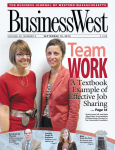 While job sharing is hardly a new concept — it’s at least a few decades old by most accounts — it has rarely succeeded, or even been tried, at a high-level administrative post, such as vice president of Philanthropic Services at the Community Foundation of Western Massachusetts, which is now being shared by Kristin Leutz and Katie Allan Zobel. For one of them (Leutz), this is a chance to live out research she did while attaining a master’s degree in Industrial/Organizational Psychology at Springfield College. For both, it’s a way to achieve coveted work/life balance while also carrying out highly rewarding work. What they’ve been doing for the past seven years can be described with one word: pioneering.
While job sharing is hardly a new concept — it’s at least a few decades old by most accounts — it has rarely succeeded, or even been tried, at a high-level administrative post, such as vice president of Philanthropic Services at the Community Foundation of Western Massachusetts, which is now being shared by Kristin Leutz and Katie Allan Zobel. For one of them (Leutz), this is a chance to live out research she did while attaining a master’s degree in Industrial/Organizational Psychology at Springfield College. For both, it’s a way to achieve coveted work/life balance while also carrying out highly rewarding work. What they’ve been doing for the past seven years can be described with one word: pioneering.
There’s a small pile of rocks — one of the owners actually called it a “sculpture” — sitting in the middle of the table, or leaf, that lies between the desks occupied by Katie Allan Zobel and Kristin Leutz.
These items come in all sizes and shapes (including a few that look like hearts — Leutz collects and treasures those), and they were brought back to Springfield from many different travel destinations. Most are gifts from one to the other, but some were found and simply added to the mix.

Kristin Leutz says the unique job-sharing situation she entered allows her to live out the research she did at Springfield College and MassMutual.
That starts with a job — vice president of Philanthropic Services for the Community Foundation of Western Massachusetts — and its salary and needed benefits. They also share an office, a copier, that leaf with the rocks, a bookcase that is far too cluttered for either one’s good, the nameplate outside the door, and even the door itself (items chosen by both, ranging from newspaper cartoons to art created by Leutz’s youngest child, now compete for space).
It’s been this way since the late fall of 2005, when Zobel and Leutz applied as a team for a position then called director of Development, and prevailed over several traditional hopefuls — meaning singular men and women — in a decidedly different candidate-selection process (more on that later).
Currently, Leutz works Mondays and Tuesdays, Zobel takes over on Thursdays and Fridays, and they’re both in on Wednesday, or what has come to be known, alternately, as ‘overlap day,’ ‘hand-off day,’ and ‘pass-the-baton day.’
Between them, they have raised between $5 million and $8 million per year, said Kent Faerber, former president of the foundation and now interim president, and been highly successful in a multi-faceted position that has involved everything from fund-development management to PR and marketing, to promoting philanthropy across the region.
“This has been a very challenging job to share because of the sophistication of the work and the need for our external constituency to feel that their relationships with the foundation are seamless,” he told BusinessWest. “While a prospective donor might make initial contact with one of them, the other needed to be able to pick that up whenever he or she might call back or make contact later. They have developed quite extensive routines of information sharing and collaboration despite the fact that they are normally not in the office or on duty at the same time.”
When asked how they are able to succeed in this unique and challenging sharing arrangement, Leutz and Zobel used different words and phrases to say what amounts to the same thing: they work hard at it. And they need to, because, while having two minds working on all that goes into this job description is certainly beneficial for the foundation, such a scenario can get complicated.
“To try to figure this out is not simple; it’s not a straightforward thing,” Zobel said of job sharing in general. “We’re true pioneers.”
That’s a word that both used early and often, because there is very little job sharing going on in this region in general, and only a few examples from across the country of it working at such a high administrative level. The two are well-aware of this, and understand that their partnership could be considered ground-breaking and a potential model.
For this issue and its focus on women in business, we take a look at this unique employment arrangement, how it came about, and why, seven years later, it’s stronger than ever.
Sharing the Wealth
Carol Leary, president of Bay Path College and a long-time (now former) board member and president of the Community Foundation, remembers the search that eventually brought Leutz and Zobel to the organization — as well as her reaction to a situation (a teamed pair of candidates) that she hadn’t seen before and hasn’t seen since, at least at that level.
“I really didn’t have to be convinced very much — I loved the concept of trying it,” she recalled. “My sense was that the worst thing that could happen was that it wasn’t going to work … and I figured it was well-worth the risk because we didn’t want to lose either one of them.”
But Faerber, president of the foundation at the time, remembers that there was considerable skepticism among other members of the search panel, especially about the logistical aspects of such an arrangement. What eventually swayed them, he believes, was the prospect of putting two strong, creative minds to work on the many challenges and opportunities that would confront whomever held that title.
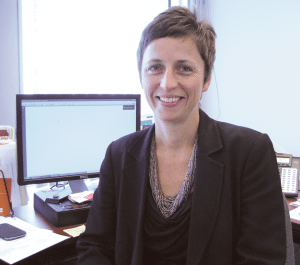
Katie Allan Zobel says she wanted to work for the Community Foundation, but couldn’t handle a 55-hour week, and the job-sharing arrangement allowed her to advance her career goals.
How these two minds came to sit across the table from those interviewers is an intriguing story, which starts at Amherst College in the mid-’90s, where Leutz and Zobel worked together in the broad realm of fund-raising and alumni relations.
They thrived in those roles, but Leutz eventually left the school to pursue a master’s degree in something called Industrial/Organizational (I/O) Psychology at Springfield College. This is an emerging field, she explained, that involves the scientific study of employees, workplaces, and organizations, and covers many aspects of human resources and organizational development, including a wide range of work/life balance issues and trends.
These specific areas of study defined her master’s thesis work at MassMutual. “I was looking at what they called alternative work arrangements there,” she explained, adding that job sharing was part of the mix, but there was a very limited study pool. “I did a large-sample survey and qualitative study of their employees and what kinds of work/life arrangements they were using — alternative schedules, part-time work, and other initiatives.”
She would eventually go on to work for the company as an organizational-development consultant in the Human Resources department, working on what amounted to the human side of a large-scale implementation of the SAP technology system. Little did she know that soon she would be taking much of what she learned in the classroom and at the financial-services giant and applying it to what amounts to a pioneering experiment.
Fast-forwarding somewhat, Faerber reached out to Zobel in the early fall of 2005 when she was an independent consultant (Amherst College was one of her clients) and asked if she could provide temporary support for the Community Foundation when its director of development was stricken with the cancer that would eventually take her life, and was then on leave of absence.
Zobel recalls being somewhat reluctant at first, but agreed, and soon found the work rewarding and the foundation an organization she enjoyed working for. “I was here for three months, and came to realize what an amazing resource the Community Foundation is. I had no idea the extent of their work and the way in which they did that work; it was both surprising and so engaging that I wanted to stay and apply for that position.”
But she determined fairly quickly that the 55-hour work week that the job entailed was something she didn’t want at that time in her life, with two young children.
Zobel recalls initial discussions with Leutz (who by this time had left MassMutual after the birth of her first child, ironically because she couldn’t work out the flex-time arrangement she desired) about the possibility of sharing this job. She did so without knowing the full extent and specific direction of Leutz’s graduate work — “I knew it was organizational development, but not much more than that” — and found her very open to what at that time amounted to exploring uncharted territory.
“This was a chance to live out my research and test it out,” Leutz recalled. “I was working way too many hours at MassMutual after the birth of my son, and didn’t have the work/life balance that I wanted. Here was the work/life expert having no balance; it was like the shoemaker’s children having no shoes. I was home with my son and ready to work, but not full-time.”
“When Katie came to me with this opportunity, which represented a chance to work in philanthropy in a way that I hadn’t before, I was excited,” she continued, “and I knew how to structure the job. So we applied for the position as a team.”
Work in Progress
Since getting the job and putting both their names on the plate outside their office, Leutz and Zobel have had an additional — and unique — segment attached to an already-lengthy job description: making their employment arrangement work for all parties involved.
This assignment involves everything from financial considerations, or costs to the organization, to ensuring seamless (that’s another word both women used repeatedly) delivery of services to the many kinds of clients who work with the Community Foundation.
As for the financial side of things, if two people are going to take a job that would normally be carried out by one individual, they theoretically can’t cost more than that one person would if things are going to work out for the company. And for the most part, that’s been the case with Leutz and Zobel.
Neither one has needed health insurance through the organization, which helps — if both did, that would be an additional expense — and their salary and other benefits amount to no more than what one individual would earn. There are some additional expenses — two computers and two phones are required, and if they travel together on conferences, there are two plane tickets and two registration fees (they split a hotel room) — but not many.
As for achieving a seamless operating environment, this involves constant and highly effective communication and making the very most of those aforementioned hand-off days.
Backing up a bit, the co-vice presidents went into some detail about what the foundation does and what their responsibilities are.
The foundation itself administers a charitable endowment consisting of approximately 528 separately identified funds (totaling $110 million) serving Hampden, Hampshire, and Franklin counties. The foundation also plays a central role in the charitable distributions from four large private foundations in the region, administered by Bank of America and representing approximately $24.6 million in additional charitable assets.
As for Leutz and Zobel, their official job description reads this way: “manage fund development and donor services; provide charitable gift-planning services to individuals, families, and groups, including planned gifts and gifts on non-cash assets; serve as a partner to local professional advisors assisting their clients in charitable giving; promote philanthropy in the region among stakeholders including institutions, individuals, and corporations.”
There are myriad responsibilities that go with that description, said Zobel, adding that, for two people splitting a week to carry them out, there must be communication, organization, and efficient sharing of those most important ingredients: information and opinions.
Elaborating, Zobel said she and Leutz will use Tuesday evening and then their traditional Wednesday carpooling (they both live in Amherst) to stay abreast of what’s happening with their many constituencies and plan a smooth flow of service and teamwork.
“On Tuesday evening, Kristin puts down in an e-mail to me what we call our ‘transition memo,’” she explained. “It explains everything that has happened, with highlights and bullets and an ongoing project list that we continually update; some things come off the project list, while others are added on that we need to do.
“We use that Wednesday commute to talk things over,” she continued. “I’ll have read the memo, looked it over Tuesday, and we’ll talk about those things that really need discussion.”
Said Leutz, “we basically talk on the phone a lot on our off days as well. We try to respect time off, but we wind up talking a lot because it makes things easier. And we use that commute to make the most out of discussing things that need decisions together or relationships that we share equally.”
Checking Your Balance
And while this job-sharing relationship has worked out well for the Community Foundation, it has also been everything Leutz and Zobel could possibly have expected from it — and more.
Indeed, they both talked about how this arrangement has done more than help them achieve work/life balance. It has also enabled them to be in a creative, rewarding job they could not have taken on otherwise, while also putting them in a collaborative environment that has allowed them to stretch their collective imaginations and become even better at what they do.
It’s such an attractive work environment that Leutz has stayed in it far longer than she has any other employment situation.
“I’m a restless person — this is the longest I’ve stuck with anything,” she said. “And I think that’s because I’m a collaborative thinker; even if I was working full-time, I would want to work this way, with people, because it enhances my production.”
Zobel agreed. “To do this kind of work on your own would be much harder. I can get a lot of feedback from Kristin throughout the week and from week to week about what I’m doing right, what I should change … I get infused with new energy.”
The downside to the arrangement, or at least one of them, they said, is that they are now latched to each other career-wise, a fairly tenuous situation, but one that neither one is worried about at the moment. After all, the relationship has survived a parental leave (Leutz had her second child a year after they took the job) and the need for both to earn higher wages, which they’ve accomplished through outside consulting work.
“You have to be much more creative with your own career to stay committed to someone at this level,” said Zobel. “That’s not necessarily a disadvantage, but it’s certainly a challenge.”
When asked if job sharing is a viable option for area companies and individuals working for them, both Leutz and Zobel said they provide ample proof that such arrangements can work.
But both employer and employees have to fully understand the concept, its many potential benefits, and the myriad challenges before they attempt to implement such a practice, they said.
And that starts with individuals fully understanding that, when they split a job, they take half the salary. That sounds simple, but many don’t get that part, said Zobel.
“People get all excited about this idea when we talk about it,” she told BusinessWest. “What Kristin and I wanted was a really meaningful, significant, meaty job, and you don’t usually get that in a part-time job; you either have to work much more than part time, or you work part-time and don’t get everything you want.
“Many of our peers feel the same way,” she went on. “And that’s why they get so excited about this. But then when they realize they only get half the salary, they get these startled looks on their faces.”
Moving beyond that all-important consideration, such arrangements can only work when the two individuals can work together effectively and establish a very high level of trust, something that has been accomplished in this case.
“I know when I’m not here, the work is getting done at as well as I would have done it, if not better,” said Leutz, “because Katie is here and I have complete trust in her.”
In general, job sharing has worked best with positions like administrative assistant, Leutz explained, but it has been effective in a variety of settings and with many different job titles.
“Any job share should be able to be matched to the work and to the role, but there are certain jobs that would be very difficult for people to share, and there are many ways that people structure job shares,” she said. “Some people have very discreet responsibilities and don’t overlap very much, and other people share everything because of the nature of the work.
“There are examples from around the country where executive-level employees, women and men, have been able to do this,” she continued. “But they have tended to structure these arrangements very creatively depending on the organization and the needs of the job. And we figured we had to do that here; we had to really understand the nature of the work and make ourselves flexible.”
Looking back, Leutz and Zobel both noted that they didn’t have all the answers for that search panel back in 2005, and that it’s taken the ensuing seven years to completely fill in their canvas. They’re not sure how long this relationship will go on, but for now they’re more than content to continue their pioneering efforts.
Two the Future
The level of sharing between Leutz and Zobel apparently goes further than the two understood — at least until recently.
Indeed, Leutz has one of those office chairs with a large rubber ball as the seat — chosen for ergonomic reasons (something else she learned while studying I/O Psychology). And when BusinessWest noted that Zobel uses a more traditional model, she admitted to her office mate, “I often use yours when you’re not here,” which was news to Leutz.
But beyond the chair, the door, the copier, and the four weeks of vacation, the two share something else — a firm desire to make this situation work both for them and the organization. It’s been something they’ve certainly had to work at, and it is that commitment to not merely a job, but also a truly unique work arrangement, that has made it successful.
You might say it’s a working situation that’s rock solid — and in more ways than one.
George O’Brien can be reached at [email protected]
The following building permits were issued during the month of August 2012.
AGAWAM
Coyote Realty, LLC
1340 Springfield St.
$750,000 — Construct new Wendy’s restaurant
Polish American Club
139 Southwick St.
$54,000 — Repair damaged roof trusses
AMHERST
Amherst College
Seligman Dorm
$35,000 — Renovations
Guidera Realty Trust
446 Main St.
$7,000 — New roof
Hampshire College
Lemelson Art Building
$55,000 — Renovation of existing office space
Holyoke Property Management
160 Old Farm Road
$70,000 — Install two new generators
CHICOPEE
Chicopee Crossing, LLC
536 Memorial Dr.
$38,000 — T-Mobile fit-out
D&D Chicopee Realty, LLC
49 Highland Ave.
$17,000 — Interior renovation
EASTHAMPTON
Interland Real Estate, LLC
180 Pleasant St.
$40,000 — Repairs for second-floor AC system
Jeanne Moore
69 Ferry St.
$25,000 — Install three antennas
Williston Northampton School
11 Payson Ave.
$10,000 — Exterior repairs
HOLYOKE
Baystate Health
361 Whitney Ave.
$72,000 — Tenant fit-out
Daughters of the Heart of Mary
1365 Northampton St.
$13,000 — Renovate existing chapel
Suffolk Realty Associates, LLC
56-58 Suffolk St.
$40,000 — Install three new wireless antennas
NORTHAMPTON
Robert Defresne
155 Industrial Dr.
$115,000 — Renovate office and enlarge break room
Smith College
44 College Lane
$290,000 — Reconstruct stairs and ramps
Smith College
Green St.
$101,000 — Divide classroom into four offices
SOUTH HADLEY
Integrity Development and Construction
216 Pearl St.
$83,000 — Construct garage
SOUTHWICK
Shatz, Schwartz, and Fentin PC
22 Industrial Park
$1,500 — Three upgraded antennas
SPRINGFIELD
Briarwood Seven, LLC
11-31 Park St.
$230,000 — Exterior renovations
Buckley, Richardson and Gelinas
1500 Main St.
$1,161,000 — Office renovations on the 26th and 27th floors
CBRE
1316 Carew St.
$30,000 — Convert drive-thru teller to ATM
Paperchine
40 Progress Ave.
$113,000 — Renovation of an office and addition of a conference room
Ronald McDonald House
34 Chapin Terrace
$162,000 — Renovate kitchen
TD Banknorth
1360 Carew St.
$57,000 — Renovation of ATM room
Valley Psychiatric Services
505 East Columbus Ave.
$108,000 — New office space and break room
WEST SPRINGFIELD
Costco Wholesale
119 Daggett Dr.
$779,000 — Erect 2,995-square-foot addition to the northwest corner of existing commercial building
John Salema
95 Memorial Ave.
$70,000 — Renovate donut shop sales area
Leslie’s Swimming Pool Supplies
3925 East Broadway
$120,000 — Renovate 3,556 square feet of existing space
The DOL’s Revenue Ruling Is Much Ado About Nothing
Much is being written about participant fee disclosure, the Department of Labor’s 404(a)(5) revenue ruling, which was implemented on Aug. 30. The new fee disclosure for retirement-plan participants went into effect, meaning that most previously hidden fees will now be disclosed to the employees who participate in their companies’ 401(k) plans or other plans.Let’s get to the real facts: some fees will continue to stay hidden. Many carriers are already rushing to circumvent the DOL’s disclosure requirement for participants’ 401(k) plans by continuing to bury them in the plan’s mutual-funds expense ratio. They will do this by creating new mutual fund share classes.
There are three levels of potential fees that participants may pay when they are enrolled in 401(k) plans:
• Fund-expense ratios. This is the amount deducted on a daily basis from each mutual fund to pay for the 12b-1 fees, commissions, advertising, and the money manager. (Note: not all funds pay 12b-1 funds, such as index of ETFs.) There is a real misnomer here regarding disclosure and transparency to participants. The truth is that the majority of participants will still not know or understand what they are paying for with this expense because it will not appear on their quarterly statements.
The expense ratio, which is declared in basis points as a percentage (such as three-fourths of a percent), will remain buried in the fund. On top of this, it will now be hidden in a pile of disclosure papers, which 401(k) record keepers must provide on an annual basis to each participant. The expense ratio for each fund will appear in this disclosure report with a per-$1,000 conversion rate per $10.
Confused yet? Of course you are, and participants will be, too. Most 401(k) plan participants (85%) don’t know and don’t want to know about any of this, and these 16- to 25-page annual reports will end up in file 13.
Have you refinanced your home mortgage lately? Thanks to Dodd/Frank, consumers receive 10 times the amount of ‘disclosure information’ they did prior to the 2008 credit crisis. Who do you think is really reading any of that information? Once again, big-government and bigger-bureaucracy do-good thinkers failed to understand a basic principle of investing: the majority of 401(k) participants don’t read the information they have now. The real proof: the majority of this information has been readily available on participant websites for years, and employees still don’t read it.
• Asset charges and wrap fees. Some 401(k) plans may charge an additional asset fee or wrap fee to cover the record-keeping expenses or fees and commissions to the plan’s advisor. If your 401(k) plan has this expense, you have not been aware of it, and it will appear for the first time starting this month. The 401(k) record keepers must convert this expense into a dollar amount and show it subtracted from the participant’s account each quarter.
Many in the press have stated that millions of participants will take to the streets when they see this hidden cost suddenly appear on their statements for the first time. I say it will be much ado about nothing. Yes, some (the minority) will read it and respond, ‘what is this?’ and go racing to their HR departments, in revolutionary mode, demanding answers. They will be told, ‘there is no free lunch, and you have been paying this; you just didn’t know!’ The vast majority will either not even notice it, notice it and not care, or notice it and realize, ‘wow, just as I thought. I have been paying something for my 401(k). I just didn’t know what, and now I do.’
I have been managing 401(k) plans for three decades. Years ago, a handful of the carriers we worked with started disclosing fees. Of all the plans we managed that began disclosing fees on their quarterly statement — did the employees react negatively? Once we met with them and showed them they had always been paying fees and that they just didn’t see the fee on their statements, the majority smiled and joined the ‘yes, Toto, we are not in Kansas anymore, and there is no free lunch’ club. That was six years ago, and no one has complained since.
Just last week, I had a meeting with the CFO of a company whose plan we had changed to a new 401(k) provider a year ago. The new provider has been reporting all fees as a dollar amount deducted from participant accounts on a quarterly basis for four quarters. When I asked the CFO if anyone has questioned this amount, he responded (rather embarrassed), “no one has said a peep, and, to tell you the truth, I didn’t even notice it on my statement.” This is the company CFO. He’s the guy responsible for watching every penny the company spends, and he didn’t even notice what he was spending on his own retirement account.
• Participant fees. These fees are usually charged directly to a plan participant to cover the cost of receiving a ‘paper’ quarterly statement, perhaps $1.25 per quarter, or to take out a loan, maybe a $100 flat fee.
The bottom line here is everyone knows there is no free lunch, even in a 401(k) plan. What matters most is what participants do with this information and what advisors can do to support greater participant success.
The 401(k) represents one of the best mechanisms for the average working American to save and invest for a secure future. The fact that some participants may be surprised that this system has a cost pales when compared to the surprise these same individuals will have if their future living expenses cost more than their ‘paychecks for life’ can handle.
Charlie Epstein, CLU, ChFC, AIF is the founder of the 401k Coach Program, which offers expert training for financial professionals to develop the skills, systems, and processes necessary to excel in the 401(k) industry and facilitate successful retirement outcomes for plan sponsors and participants. He is the author of the book Paychecks for Life, which offers nine principles for participants to turn their 401(k) plans into a secure retirement income. He has frequently been named to 401kWire’s Top 100 Most Influential People in the 401(k) Industry List and Top 300 Most Influential DC Advisor List. He is a member of the Legg Mason Retirement Advisory Council; (413) 478-8580; [email protected]
Scuderi Group Continues to Seek Its Next Breakthrough
Changing the world isn’t easy. But the Scuderi family never expected that it would be.“Our biggest hurdle, basically, was getting the engine to work. That took a lot of engineering,” said Bill Wrenn, director of marketing for the Scuderi Group, the West Springfield-based company that has spent the past decade attempting no less than a revolution in energy-efficient automotive technology.
“We first fired it up on June 25, 2009; that’s when we got the prototype up and running for the first time,” Wrenn continued. “And that really was the biggest question leading up to that point: will this work? Well, it not only works, but it has worked a lot better than anyone had thought originally.”
The promise of the Scuderi split-cycle engine, as it’s called, is that it could dramatically increase the efficiency of a machine — the internal-combustion engine — that has been notoriously resistant to such efforts in the more than 130 years since it was invented.
It all began in the mind of Carmelo Scuderi, who developed the concept shortly before he died in 2002. His sons — Sal, Stephen, and Angelo — have spent the years since honing the idea, raising millions of dollars in research funding, and preparing to market the final product. They were aided in building a prototype by Southwest Research Institute in San Antonio, Texas., and have since opened offices in the automotive hotbeds of Germany and Japan, making the Scuderi brand an international presence.
But the amount of hype surrounding the engine has some wondering when it might finally appear in a marketable vehicle. To which Wrinn urges patience, while fully acknowledging the complicated nature of the Scuderis’ efforts.
“Anyone who’s not skeptical about this engine doesn’t understand the complexity of the combustion engine,” he told BusinessWest. “It’s not like trying to build new office furniture and sell it; these are very scientific processes we’re working on.”
But he pooh-poohs any notion that the auto or energy industry has hindered progress on a more energy-efficient machine. “We’ve had no visits from men in dark blue suits telling us to go away,” he said with a laugh. “But the attraction has varied from continent to continent and continues to change.”
Change Resistant
The first four-stroke piston engine was developed in 1876, and remains the primary design of engines today. And despite the myriad changes to automotive technology over the past century-plus, the efficiency of this engine design has remained largely unchanged. Specifically, it operates at about 33% efficiency, meaning that only one-third of the energy in each gallon of fuel is used to power the machine, and the rest is lost through friction and heat.
The Scuderi Group believes their model could finally change that equation. They note that the heart of the internal-combustion engine is a piston connected to a crankshaft, moving up and down in a cylinder through the intake, compression, power, and exhaust strokes. In a typical four-stroke cycle engine, power is recovered from the combustion process in these four separate piston strokes within each single cylinder.
The Scuderi split-cycle engine changes the heart of the conventional engine by dividing the four strokes of this cycle over a paired combination of one compression cylinder and one power cylinder. Gas is compressed in the compression cylinder and transferred to the power cylinder through a gas passage.
The gas passage includes a set of uniquely timed valves, which maintain a precharged pressure through all four strokes of the cycle. Shortly after the piston in the power cylinder reaches its top, center position, the gas is quickly transferred to the power cylinder and fired (or combusted) to produce the power stroke.
By splitting the strokes of the cycle over a pair of dedicated compression and power cylinders, the design of each cylinder can be independently optimized to perform the separate tasks of compression and power.
The Scuderis have called the engine “disruptive technology,” meaning it has the potential to shake up an industry. Wrenn said the family has been pleased with the engine’s performance so far.“To put it in perspective, we’re at the genesis of a new thermodynamic process, a new way of creating combustion that has never been discovered before,” he said. “We’re discovering interesting new facts about the engine’s potential ability to do certain things and how much power it can produce.”
Since the prototype was completed, Wrenn said, “we’ve spent a lot of time collecting statistics and measurements and simulating how the engine would work in typical vehicles. One test took a typical European economy-class vehicle — these are some of the most efficient vehicles in the world — and, with the Scuderi engine, took the car through a typical drive cycle in various driving modes. What we found was, where normally those cars would get 52 miles to the gallon, the Scuderi engine got more than 65. On the emissions side, we emitted 85 grams of CO2 per kilometer, compared to a conventional engine with 104 grams per kilometer.”
Beyond the basic concept, the company is generating additional energy savings from an innovation it calls the air hybrid, in which it stores energy as compressed air during braking and feeds it into the combustion cylinder when the car is accelerating. Electric hybrids also use braking force to store energy, but in a battery, and the Scuderi Group points out that batteries are costly, heavy, and wear out — and are hazardous to dispose of.
Sal Scuderi told the Wall Street Journal recently that the company is getting close to licensing its technology for production, but scoring an automotive customer is challenging. “You can’t beat [incumbent engine designs] by a little bit. You have to beat them by a lot.”
The test Wrenn cited may fall under the ‘little bit’ category, but, “since then, the data has gotten even better,” he told BusinessWest. “Since then, we’ve made tweaks on our valve systems, and we’ve found that we can manipulate it even more, increasing power and also bringing down fuel combustion. That has been an extremely exciting discovery.”
The Next Phase
Wrenn said the Scuderi family is fond of the quote often attributed to Mahatma Gandhi: “first they ignore you, then they ridicule you, then they fight you, then you win.”
“We’re definitely going through those stages right now, and we’re turning a corner where it’s becoming more accepted,” he said. “It’s been really interesting.”
For example, “our engine has applications in other industries,” he noted. “I think everyone has associated us with the automotive industry. Yes, it’s a car engine, but we are now being looked at as a solution not just for automotive applications, but power generators, compressed-air energy-storage solutions, and distributed power.”
He said the Scuderi Group has negotiated with multiple manufacturers in more than one industry and could be close to a licensing deal, although he could share no details yet. But he said the confidence of the family in their father’s dream has never wavered.
“As new discoveries have created new opportunities for success, we’re even more excited about it,” Wrenn said, adding that one of the most intriguing parts of the process has been opening up the concept to engineers of all stripes.
“The family chose long ago to begin to promote the technology, but at the same time it’s being developed, we wanted to bring the engineering community along for the ride,” he explained. “We’ve always known that, once the engine starts to get worked on by the greater engineering community around the globe, they’re going to discover a few new things and make it better. We think that’s fascinating and a great thing.”
In other words, the biggest news with the Scuderi split-cycle engine is still a ways down the highway — and this globetrotting family is enjoying the ride.
Joseph Bednar can be reached at [email protected]
Eastover, a Blast from the Past, Has a New Owner and New Vision
 Two inexpensive Adirondack chairs sit side by side overlooking the Mt. Greylock range and October Mountain on one of the highest points of the 550-acre Eastover Hotel & Retreat campus in Lenox. They were put there by the facility’s new owner and head chef just to grab a few minutes to relax whenever they can.
Two inexpensive Adirondack chairs sit side by side overlooking the Mt. Greylock range and October Mountain on one of the highest points of the 550-acre Eastover Hotel & Retreat campus in Lenox. They were put there by the facility’s new owner and head chef just to grab a few minutes to relax whenever they can.
“But every time we look, guests are sitting in them, and we never get a chance,” laughed Josh Mouzakes, executive chef for the recently purchased 100-year-old Gilded Age mansion and retreat property. “We picked them up at BJ’s … it’s kind of our joke.”
The fact that these two haven’t had many opportunities to sit and enjoy the stunning view bodes well for Eastover. For starters, they haven’t had the time, because they’ve been busy with a massive restoration effort that is still a work in progress. And when they have found a few minutes, paying customers have beaten them to it.
There haven’t been any of those at Eastover for some time. Indeed, this resort with an intriguing though somewhat checkered past that included rock concerts and get-togethers for nudists (more on all that later) had fallen on hard times — make that very hard times — in recent years, and is now looking at a future dominated by vast potential but also question marks.
That’s because the new owner, Long Island resident and former software engineer Yingxing Wang, doesn’t know exactly what she wants to do with the place. She has some ideas, mostly involving education, science, and nature — her original vision was for an international student exchange and destination for teens to learn about farming and gardening — but the vision is still coming together.
While work continues on the mansion, which Wang acquired for just under $5 million, the facility has reopened and hosted a few events, such as a fashion show — Wang and Mouzakes both call this summer a “test run” — with more on the docket, including a weekend rock festival later this month, a mini-Woodstock aptly named BerkshireStock.
After that, well, it’s probably up to the imagination of people who see and read about Eastover and imagine the possibilities, said Wang, who did essentially that, only on a much grander scale, when she first saw the mansion. Curiosity eventually led to speculation, and a rehab job she couldn’t have imagined when she signed on the dotted line.
“I was curious about what was behind the brick and iron fence on East Street,” she told BusinessWest. “But I didn’t comprehend the extent of the structural work at the time.”
The intensively private Wang, who declined to be photographed for this story, deferring to staff instead, didn’t say how much she and her husband, a partner in a computer firm, have sunk into this restoration, but hinted that it’s more than the purchase price.
From a business perspective, she’s not sure when or even if she can recover those costs, but for now she’s content to let her imagination be her guide and business partner.
For this issue and its focus on meetings and conventions, BusinessWest ventured to Lenox to chronicle the emerging next chapter in the story of Eastover. No one knows how it will unfold — not even the people writing it.
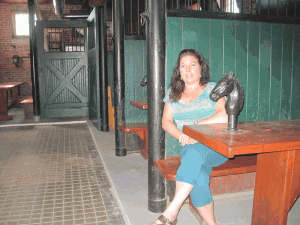
Donna Zsofka says the Old Stable, featuring a new sound system, is spacious enough to host up to 475 guests.
Past Is Prologue
That story begins in 1910, near the end of the Gilded Age, when Harris Fahenstock, a founding member of the First National Bank of New York, built the estate as a summer cottage, one of many that were built in Lenox during that period.
Sold by Fahenstock’s heirs in the 1940s, the property was eventually acquired by Stamford, Conn. resident George Bisacca at auction for a mere $41,500. He founded Eastover Resort in 1947.
Bisacca, a former clown in the Ringling Brothers Circus (which explains the strange primary ‘clown colors’ painted all over the mansion basement walls), made his money in a tire-repair shop. According to local legend and some published reports, he was entrepreneurial, a free spirit, a forward thinker, and a partier. Blending those traits, he created a then-rare resort for singles, which thrived in the ’50s and ’60s. He later added family-oriented activities as the young Baby Boomers shifted their leisure-time needs.
A Civil War buff, Bisacca had an extensive war-memorabilia collection, and kept a herd of bison on site, which, in addition to the unique ‘lifestyle-themed’ weekends (for bikers, nudists, non-drinkers, and women only), made Eastover a one-of-a-kind destination in the Berkshires and the Northeast in general. Bisacca’s daughter and granddaughter, Dorothy “Ticki” Winsor and Betsy Kelly, respectively, continued the resort theme after his death until 2003.
Wang admitted that she knew little of this history when she first encountered Eastover, and “fell in love with the place.”
Actually, what she loved was its potential, the location, and the views. The mansion itself was in very tough shape following years of neglect, both before and after it ceased being a resort destination.Indeed, while reports say the mother-daughter team that operated Eastover after Bisacca’s death proudly boasted that little had changed since the resort first opened in 1947 (which was a plus for a strong following who happily returned year after year), that phrase also applied to the 20-plus buildings and the entire infrastructure. In short, there was no upkeep.
“There really wasn’t any infrastructure,” said Wang, adding that recent, and costly, renovations include new slate roofs on the stately stable, which houses the giant dance hall, the largest of its kind in Western or Central Mass.; a water main and sewer main; fiber optics and cable TV; a completely renovated indoor pool and slate walkways; all new, ADA-required handicapped ramps and bathrooms; working exit signage; sprinkler systems; and much more.
Wang admits that most developers would have bulldozed the place and started over, but she was able to look past all the work and see the beauty and potential that was clearly there. And she thanked town officials for facilitating her efforts.
“I have to say that the board of selectmen are pro-business, and considering the amount of work that we have done over the past three years, it would be nearly impossible in this time if we didn’t have their help.”
One person she credits with a majority of that help is Lenox Building Inspector William Thornton Jr., whom she has leaned on considerably after realizing the full extent of the money pit she’d purchased.
“I joke that Bill was our most affordable consultant; he knows code by heart, and I call him on his cell phone when I have a question instead of some expensive consultant,” she said, adding that her professional association is very serious. “Yes, he is strict, but very fair, and he is demanding of everybody.”
Thornton isn’t the only one Wang leans on as she dives into a business venture and an economic sector — hospitality — that she admittedly knows little about.
She’s also relying heavily on Mouzakes, who brings not only culinary expertise to the equation, but also experience with opening hotels.
The reason he is now the chef at Eastover is due to his connections to well-known master chefs in the New York area and Europe, and as a quasi-hotel consultant, based on his experience in opening hotels on Long Island, New York, and, most recently, the five-year, $20 million rehab of the Lord Jeffery Inn in Amherst.
He said his cuisine style is contemporary American with French-influenced techniques (picture food creatively arranged on a plate that not only offers phenomenal flavor, but looks like art).
“The easiest way to categorize it is with local, sustainable, modern ingredients,” he explained. “If we can get the best food we can get, as close as possible, and use properly rained skills, that will be our signature.”
“That’s what we treat food here like — art,” added Wang. And the fresh ingredients for that art will soon start growing right outside the slate patio with an herbal garden on the site of the former outdoor pool area, which was in such distressed condition, it had to be filled in.
Looking Forward
When asked if Eastover is or will become competition for neighboring exclusive destinations such as Cranwell Resort Spa & Golf Club and Canyon Ranch, Wang paused and then offered some levity.
“The reason we have no competitors is because no idiot in this world would invest so much money in this,” she told BusinessWest before turning more serious and noting that Eastover won’t be like those resorts in many respects. “We are different; the focus on nature is what sets us apart.”
She stressed again that she doesn’t know exactly what the resort will become, but she knows what it won’t be.
“I’m not exactly sure how we will end up, but we are not a fancy hotel with room service,” she explained. “We are a retreat to enjoy nature, and if you are looking for that other type of place, then it’s not here.”
She also knows that her original vision — of a destination for foreign-exchange students — is not economically viable. But she and her staff of nearly 30, including Mouzakes and Donna Zsofka, the event coordinator, are letting clients and potential clients help shape what Eastover can become.
Things started with a grand-opening weekend in June, which both Wang and Mouzakes say had its share of successes and small disasters. Shortly thereafter came an international fashion show that brought young people from the New York City area. On the calendar are a fund-raiser later this month for the Berkshire Grown project, which supports local farmers and food pantries, as well as BerkshireStock.
Wang said that two-day event will present 30 local and regional bands (who are all selling tickets) and could attract several thousand concertgoers and overnight campers to the property. “We can handle up to 5,000 easily because that field is a natural amphitheater,” she noted.
“Aside from our opening weekend, people have come to us with events they want to do here,” said Mouzakes, pointing to BerkshireStock as a prime example of how the venue will likely be become popular for people looking to stage events and get-togethers that would be considered beyond the ordinary.
Now open for business, said Zsofka, is the Tally Ho Pub, which offers unique seating in the former horse stalls (10 per booth), and is open to the public Fridays and Saturdays. Weddings, family reunions, and corporate events can be booked in the wood-paneled library or two other lavish mansion rooms that can accommodate 25 to 40 people, while the light-drenched Terrace Room can seat nearly 150.
Big enough for any event, said Zsofka, the Old Stable, with its new sound system, allows seated dining for 350 guests with a total capacity of 475, and at some point, Mouzakes will be refining the plans for a fine restaurant that will draw produce from local farmers as well as that soon-to-be-added herbal garden.
In the mansion, Wang is adding high-end bathrooms to each of the large second-floor former bedrooms (all have original fireplaces), which will reduce the guest rooms from 15 to 12, but offer at least one floor of exclusive quarters.
For now, marketing has been limited and understated (there is a Facebook page), said Mouzakes, adding that word-of-mouth is helping people discover — or, in many cases, rediscover — Eastover. Both he and Wang believe curiosity on the part of many who came here decades ago is helping to fill hotel rooms, generate inquiries about future events, and, yes, fill those aforementioned Adirondack chairs.
And it is the resort’s early success in attracting young people that has Wang encouraged — and on a number of levels.
She said her many visits to Lenox have convinced her that the area needs an infusion of youth — not that aging Baby Boomers are not welcome; they certainly are — but she is also encouraged by the younger demographic’s interest in the environment and getting in touch with nature.
“I am surprised to find that the upper-middle generation is not appreciative of the environment; it’s the young people who are,” she noted. “They have been taught about nature since they were young in school, and we need to figure out how to bring more young people here.”
Time Will Tell
While Eastover is officially open for business, there is still considerable work to be done at what could be called a resort-in-progress.
“I tell my staff to just follow your heart — everything will follow,” said Wang. “I also tell them to appreciate the process.”
That process won’t actually end, said Wang and Mouzakes, noting that the vision for the new Eastover, if it can be called that, will probably take years to become reality.
It might just be that long before these two can actually get to sit in one of those Adirondack chairs. But they’re certainly not complaining, because that means they’re very busy, and that people are once again discovering Eastover.
Elizabeth Taras can be reached at [email protected]
The Growing Problem of Tax-return Identity Theft
One of the great scams being perpetrated today is what’s known as tax-return identity theft. Unscrupulous thieves are using stolen identities to prepare tax returns on behalf of unsuspecting individuals, and reaping thousands of dollars per false return filed.
How big of a problem is it? Treasury Inspector General Russell George said back in May that criminals who file fraudulent tax returns by stealing people’s identities could rake in an estimated $26 billion over the next five years because the IRS cannot keep up with the volume of the fraud. That’s a sobering figure.
How do you know if you have been subject to tax-return identity theft? Basically, after you file your actual tax return, you will get a letter from the IRS that says something like, “thank you for filing your tax return. However, we already received your tax return back in February.” That should trigger a big alert that something is seriously wrong. Residents of Puerto Rico have it even worse, since they don’t need to file a U.S. tax return unless they have U.S. activity. As such, when their identities are stolen for tax-return purposes, they don’t even get a warning letter, because they may not have had to file a U.S. tax return. Thus they don’t even know their identities were stolen in the first place. As a result, Puerto Rico has become a priority for the IRS.
The identity thieves basically make up everything on the tax return and prepare the return in such a way that a huge refund is expected. The refund is sent electronically, and the thieves now have loaded-up debit cards. The average theft appears to be in area of $5,000, and the aggregate problem is in the billions of dollars.
It is absolutely imperative that people be more diligent with respect to whom they provide their private and financial information. Further, it is more important than ever for businesses to be extra diligent in the safeguarding of that information. Massachusetts General Law CMR 17 mandates that organizations maintaining private information do so with strict accordance to the law. Therefore, ask how your lawyer, accountant, tax preparer, medical center, new or used car dealer, mortgage lender, bank, etc., safeguards your personal information.
I don’t believe it is unreasonable to predict that random, educational ‘spot testing’ by taxing authorities, in the form of actual physical visits, is in the future to help alleviate the hemorrhaging of personal information. As such, the best advice I can offer to everyone is to prepare to be able to explain to clients, customers, and the IRS, for that matter, exactly how you safeguard private information.
Here’s an example. Our office is on the top floor of our building, and there is no elevator access after working hours or weekends and holidays without an access key. Besides the small fortune we invested in electronic security, our office is equipped with motion alarms and continuously recording cameras. We have a camera in our file room. With the permission of our building owner, we even have cameras outside of our leased office space. That’s how serious we have become with security.
Although this whole issue is due to unscrupulous individuals, I believe both the IRS and the Commonwealth of Massachusetts bear some responsibility here. The rush to mandate e-filing for everyone obviously happened faster than the IRS and the Commonwealth’s ability to monitor it, as we can see from the epidemic of tax-return identity theft. At least with paper returns, W-2s were attached, and the returns were signed by taxpayers and preparers. Presently, none of these safeguards are required by thieves, and the proverbial rooster is in the electronic hen house.
Tax returns can be filed electronically from anywhere; interestingly, one of the great tax-return identity-theft operations originated out of the Dominican Republic. The only reason this operation was discovered was because several New York City postal employees were contracted by the thieves to deliver tax refunds to certain P.O. boxes. The only ones captured were the postal employees, because the organizers of the fraud were never caught.
Even the IRS inadvertently discloses personal information. I am personally aware of a very recent situation where an IRS letter was inadvertently sent to the wrong address. As a safeguard, the IRS letter indicated only the last four digits of the taxpayer’s Social Security number. The recipient wanted to do the right thing and wrote a letter to the IRS with a copy of the original letter, in the hopes that the IRS would understand that they had the wrong address. The IRS responded with a “thank you, we’ll get back to you” and, as an added bonus, provided the entire Social Security number of the taxpayer to this complete stranger. Now that is a very serious breach of security. We have notified the IRS Commissioner in Washington of this particular situation, and we hope we are able to help prevent an unfortunate security breach from occurring again.
Exempt organizations need to be more careful also. Lois Lerner, the IRS director of Exempt Organizations (and a Western New England University graduate), in a speech this past April at Georgetown University, warned about “an important issue of the day.” Between 2001 and 2006, more than 132,000 charities included at least one Social Security number on their tax returns. Those were the Social Security numbers of donors, trustees, employees, directors, scholarship winners, and the tax preparers themselves (the last of which is inexcusable, given the availability of preparer tax-identification numbers). Thus, make sure that any not-for-profit organizations that you are involved with aren’t revealing anyone’s private information, because once it’s on Guidestar, it’s public.
In summary, tax-return identity theft is real, and it’s going to be with us for a while. In the interim, it is imperative to be more diligent with your private information than ever before, ask more questions of those who maintain your private information, file your tax returns as early as possible (thus circumventing a theft), and, for business owners and professionals, treat your customers’ and clients’ private information as though it were currency, because, frankly, it now is.
Paul L. Mancinone is a principal with Paul Mancinone Co., P.C. in Springfield. His practice is primarily focused on taxpayer representation before federal and state agencies, and also has a recurring client base of individuals and business entities; [email protected]
The following is a compilation of recent lawsuits involving area businesses and organizations. These are strictly allegations that have yet to be proven in a court of law. Readers are advised to contact the parties listed, or the court, for more information concerning the individual claims.
HAMPDEN SUPERIOR COURT
Easthampton Savings Bank v. JRE Masonry & Restoration Inc. and Amanda and Jerome Ezold
Allegation: Failure to make payment on a revolving line of credit: $74,711.84
Filed: 7/17/12
Forish Construction Co. v. Dallaswhite Corp. and DeNardo Realty, LLC
Allegation: Defendant has failed to pay for services rendered and materials supplied: $132,329
Filed: 8/9/12
J.D. Contracting Inc. v. Seaver Construction Inc. and Berkley Surety Group, LLC
Allegation: Breach of contract for services, labor, and materials: $439,163.54
Filed: 7/31/12
HAMPSHIRE SUPERIOR COURT
Akiva Cahn-Lipman v. Smith College
Allegation: Breach of employment contract: $86,293.92
Filed: 8/2/12
DGA Realty, LLC v. University Motors, LLC
Allegation: Breach of lease agreement: $100,000
Filed: 7/12/12
M.J. Moran Inc. v. Standard Builders Inc., Amherst Inn Owner, LLC, and Amherst Inn Co.
Allegation: Breach of contract on construction project: $703,754.55
Filed: 7/16/16
Safe Environment of America Inc. v. G.V.W. Inc. and Berkley Regional Insurance Agency
Allegation: Failure to pay for asbestos and other environmental services provided: $600,000
Filed: 7/10/12
Collins Electric Co. Inc. v. Standard Builders Inc., Amherst Inn Owner, LLC, and Amherst Inn Co.
Allegation: Breach of construction-project contract: $811,503.44
Filed: 7/16/12
NORTHAMPTON DISTRICT COURT
Easthampton Savings Bank v. Core Chiropratic Clinic
Allegation: Default on revolving business credit note: $12,014.66
Filed: 7/6/12
SPRINGFIELD DISTRICT COURT
Dolliff & Co. Inc. v. Hampden Structural Systems Inc.
Allegation: Balance due for brokerage Services provided: $8,424.32
Filed: 8/9/12
Liberty Mutual Insurance Co. v. Performing Arts Building and Renovation
Allegation: Non-payment on workers’ compensation policy: $6,442.04
Filed: 8/10/12
Patmar Supply Inc. v. Duziem Laboratories
Allegation: Non-payment of goods sold and delivered: $6,375.16
Filed: 8/7/12
TD Banknorth, N.A. v. Vins Inc. and James Rothera Jr.
Allegation: Default on promissory note: $20,098.34
Filed: 8/6/12
United Rentals v. Hergon Design Inc.
Allegation: Non-payment for materials, equipment, and services on a construction project: $10,240.40
Filed: 8/14/12
WESTFIELD DISTRICT COURT
Tighe & Bond Inc. v. Fortis Property Group, LLC
Allegation: Breach of contract and balance due for engineering services rendered: $12,435.91
Filed: 8/9/12
Some Business Ideas to Challenge Our Thinking
The company president was excited about a popular cartoon depicting warriors fighting a battle with bows and arrows, along with a suited salesman carrying a machine gun and a briefcase. “Can’t you see I have no time to see a salesman,” says a beleaguered officer. “I’ve got a battle to fight.” Ironically, this is the same executive who nixed new opportunities for his company to grow its sales.
Ideas challenging the status quo can face roadblocks in just about any company, whether in sales, marketing or, most importantly, the future. Yet, it may be that those are ideas that can let in more light so that effective change can take place. Here are six of them:
• Business owners can be wrong. Scratch entrepreneurs, and it doesn’t take much to discover their immense pride in the business and, ironically, a dogmatic belief in their own ideas that may do it damage.
A president of a highly successful industrial business became so enamored with breaking new ground in his industry by selling equipment on the Internet that he made a substantial investment in an e-commerce Web site without taking the time to determine whether or not customers would purchase his company’s type of products online. The venture failed — and, worse yet, just at the time when the recession began taking its toll on the economy.
What we think about our business can distort reality and interfere with meeting today’s challenges and tomorrow’s opportunities.
• Everything is never on the table. It’s pure posturing, and anyone who puts it to the test gets hurt. Just ask GM’s recently fired marketing chief, Joel Ewanick. He’s the one who came up the Chevrolet campaigns “Love it or return it” and “Chevy runs deep.” He also opted out of Super Bowl advertising and cancelled GM’s Facebook ads just prior to the social-media giant going public.
Most revealing, he also discovered that other things run even deeper at GM; namely, “that ain’t the way we do it around here.” When someone says, “everything is on the table,” don’t believe it. They may think they mean it, but putting them to the test can be dangerous. There are always ideas, practices, and activities that are untouchable.
• It’s all about strategy. When the Boston Business Journal asked Mark Kerwin, deputy director and chief financial officer of Boston’s Museum of Fine Arts, about the biggest challenge he faces in his field today, he gave his answer in six words: “staying strategic as opposed to tactical.”
Steve Jobs couldn’t have said it better. First and foremost, he was a brilliant strategist. His commitment was to building a company that built beautiful things that consumers admire and love to use in their daily lives. It’s no accident that M.G. Siegler of TechCrunch describes Mountain Lion, Apple’s latest operating system, as “definitely the most polished and robust version of OS X yet.”
Tactics are easier to understand and far more fun, but most of the time, they’re temporary and don’t advance us to the goal.
• ‘Customers for life’ is deception. Why? Because it’s counterintuitive, naïve, and even dangerous. Yet, these three words seem so ingrained in our thinking that Googling them produces 1,390,000 results. Even against such a mountain of evidence, it’s still an illusion.
On the face of it, it should be obvious that customers are never for life: they die, find a better deal, move, change their lifestyles, retire, or want something new. In B2B, some merge or sell, go out of business, or become obsolete.
In spite of doing everything possible to keep customers happy and satisfied, they still leave. Yet, bloggers, speakers, and business writers implore us to embrace the belief that we can keep them forever.
Businesses are best served by abandoning mythical thinking, such as customers for life, and embrace reality with a nothing-is-forever mentality.
• Downed by the demon of self-deception. More than just about anything else, self-deception is the biggest human stumbling block, and just about every business is plagued with this unrelenting problem.
In a study of a group of college students, researchers discovered that cheating gives students false confidence in their abilities, according to a report in the Chronicle of Higher Education. The upshot seemed to be that, once we lie, it doesn’t take much for us to convince ourselves that we’re not lying.
Ask the president of a highly successful consumer-services company to describe his primary business objective, and he would undoubtedly say, “putting our customers first.” In all sincerity, he would mean it. Yet, this same president sent a letter to his customers filled with dozens of references as to why customers should do business with his company, but no rationale was given as to why it would benefit the customers to do so. It was as if he was writing the letter to himself.
To test out just how widespread self-deception is in business, watch the employees’ faces when the president or sales manager is holding forth on the company’s newest product launch, announcing next year’s goals, or the need to increase productivity. Then, you can see the clash of two quite different realities.
• Forget about the ‘Great Person.’ At Talbot’s, the women’s clothing retailer, there has been a parade of CEOs, each one with the answer to the company’s troubles and each one taking it deeper into lower sales and increased debt. The story is the same at Yahoo, where hope now hangs on yet another CEO.
It might be helpful if boards of directors stopped wanting to believe that the next executive holds the key. The ‘Great Man/Person Theory’ has had its day, even though its vestiges can be found everywhere, including business.
The fallacy rests in believing that success will follow with the right person. But, as science writer Matt Ridley notes, innovation depends on exchange. For example, he points to Uruk, in Southern Mesopotamia. It “was probably the first city the world has ever seen, housing more than 50,000 people within its six miles of walls. Uruk, its agriculture made prosperous by sophisticated irrigation canals, was home to the first class of middlemen, trade intermediaries.”
Arguably, it’s the same in America: Silicon Valley in technology, Boston in medical care, New York in finance, and Las Vegas in casinos.
As Ridley points out, “in the modern world, innovation is a collective enterprise that relies on exchange.”
In business, as elsewhere, ideas, as much as action, make a difference. Companies that put action above ideas may find that they are doing a lot of things backwards.
John R. Graham of GrahamComm is a marketing and sales consultant and business writer. He publishes a monthly e-newsletter, “No Nonsense Marketing & Sales”; (617) 774-9759; [email protected]; johnrgraham.com
PeoplesBank Branch Achieves Gold Status for Green Design

The branch pre-treats stormwater runoff with a landscaped and vegetated rain garden, so that about 80% of suspended solids in the water are removed on site before entering the stormwater system.
Peoples made news in 2011 when its new branch on St. James Avenue in Springfield received Silver certification from Leadership in Energy and Environmental Design (LEED), a program of the U.S. Green Building Council that promotes energy-efficient and ecologically friendly construction across the country.
This summer, PeoplesBank exceeded that benchmark with its new branch on Memorial Avenue in West Springfield, to which LEED has awarded Gold certification, only the second community-bank branch in Massachusetts to achieve that status. Bowen says it won’t be the last.
“For years, PeoplesBank has been supporting the community in a variety of ways. That’s what community banks do,” Bowen said. “We have taken that thought — supporting the community — and extended it to the environment.
“These green branches, built in a very responsible way, are a natural progression for us,” he added, noting that customers have been receptive to a host of environmentally conscious efforts — including the bank’s financing of more than $50 million in wind, hydroelectric, and solar-energy projects throughout the region.
“They’re a key part of why we do this. It’s a value that’s important to our customers, and whenever we can, as a company, we try to align our corporate values with those of our customers, community, and employees.”
On Point
LEED operates on a system of points, which developers amass with each ‘green’ feature implemented in a building project. Among the amenities at the new PeoplesBank branch in West Springfield are:
• A healthy interior space that utilizes low-VOC paints, coatings, adhesives, sealants, furniture and carpets. VOC stands for volatile organic compounds, which can be unhealthy to breathe in;
• Improved indoor air quality using high-efficiency air filters and dedicated room exhaust systems;
• Cool-roof materials that reduce the amount of solar heat absorbed and radiated back into the environment;
• Increased natural daylight in the building, reducing the need for interior lighting;
• Installation of recycling bins for metal, plastic, glass, paper, and cardboard;
• Drought-resistant landscaping and irrigation systems to reduce water consumption;
• Systems that reduce clean-water usage by more than 44%;
• Energy-saving HVAC and lighting systems; and
• More than one-third of all building materials were extracted, harvested, recovered, or manufactured within 500 miles of the project site, reducing the need for fossil-fuel-consuming transportation.
The building also scored points for replacing an existing structure, rather than using undeveloped land, Bowen explained.
“West Springfield is not a new construction,” he said. “We used the footprint of a building which had been at that location, and when you reuse land, reuse an existing property, you’re keeping waste and demolition material from landfills. In fact, we recycled 95% the [demolition] material that was there. By reusing materials and recycling, it certainly reduces the impact on the landfill, and that gets greater credit in the LEED process.”
Because the building operates more efficiently than a conventional bank branch, the improvements will pay off over time in cost savings. That’s true of the St. James Avenue site as well, but the West Springfield site went beyond that first LEED project in other ways, contributing to its Gold status.
“Here, we’ve got a rain garden that collects water runoff, and we’ve got drought-resistant landscaping. Those were two features not fully implemented with St. James Avenue,” Bowen said. “And then we’ve got the usual high-efficiency water, and we’ve made strategic use of lighting, which reduces utility costs. And the low-emitting paint is also a green element — all these things make buildings better and healthier for people to work in.”
LEED by Example
Ludmilla Pavlova-Gillham, chair of U.S. Green Building Council, Massachusetts Chapter, West Branch, noted that PeoplesBank is in many ways a community organization with responsibilities in its cities and towns. “It is a bank that supports local investment is already tied to the community in a big way. So when then choose to do something better, everyone benefits.”
The bank’s environmental investments have far-reaching effects, Bowen said. For instance, the hydroelectric power generation financed by Peoples will help supply energy to the Massachusetts Green High Performance Computing Center in Holyoke.
“We want to bring that care for the environment into our core banking activities,” he told BusinessWest, and so the green branches are an expression of that.”
Expect such branches to become the norm, too, as PeoplesBank expands. It has already broken ground on a new branch in Northampton which will seek LEED certification, and another to follow in Wilbraham will do the same.
“We’re committed to building all our branches green” going forward, Bowen said. In addition, the bank is installing electric car charging stations at its West Springfield and Northampton locations, as well as its corporate headquarters in Holyoke — reflecting what the president calls a green-centric culture throughout the company.
“We have an active environmental committee that runs an Earth Day Fair every year, in addition to many other activities, to keep us focused on being green at home and work,” he said.
“Being green and doing business in an environmentally friendly way and supporting energy efficiency and community efforts that accomplish these same efforts — that’s all part of our values. That’s where our passion lies, and it’s that passion that makes PeoplesBank unique.”
Joseph Bednar can be reached at [email protected]
The following building permits were issued during the month of August 2012.
AGAWAM
Agawam Dogworks, LLC
860 Suffield St.
$50,000 — Interior renovations
Coopers Commons, LLC
159 Main St.
$10,000 — Renovation of existing space into restaurant
Crown Castle
628 Meadow St.
$15,000 — Upgrade antenna panels
CHICOPEE
200 Tillary, LLC
165 Front St.
$8,000 — Re-roof
First Central Baptist Church
50 Broadway St.
$7,000 — Interior renovation for chairlift
One Putt Inc.
1469 Granby Road
$12,000 — Addition at Soft Touch Auto Wash
Gotpac, LLC
13 Center St.
$15,000 — Outdoor bar pavilion foundation
GREENFIELD
American Tower Corp.
1385 Bernardston Road
$15,000 — Antenna upgrade
American Tower Corp.
180 Country Club Road
$15,000 — Antenna upgrade
Apple New England, LLC
141 Mohawk Trail
$35,000 — Perform cosmetic changes to the interior of existing Appleby’s
Baystate Franklin Medical Center
164 High St.
$10,000 — Construct north building separation
Baystate Franklin Medical Center
164 High St
$4,200 — Install new fire-rated door
Joel Tognarelli
85 Pierce St.
$12,000 — Office renovations
Leo P. Lachance
487-489 Bernardston Road
$36,000 — Change layout of rental space for new tenant
William Goly
286 Federal St.
$23,000 — New addition
LUDLOW
Aristides Nunes
387 East St.
$4,300 — Alterations
St. Paul Church
115-123 Hubbard St.
$21,000 — Reshingle
SOUTH HADLEY
2nd Baptist Church
589 Granby Road
$15,000 — Remodel
R.E. Reynolds
480 Granby Road
$20,000 — New roof
SOUTHWICK
O’Leary Group Inc.
9 Sam West St.
$253,000 — New building
SPRINGFIELD
AIC
963 Main St.
$71,000 — 900-square-foot bathroom renovation
AIC
1067 State St.
$101,000 — 3,500-square-foot renovation at Cournioles Hall
C&W Real Estate Company
1200 Main St.
$100,000 — Renovation of second-floor suite
Picknelly Family Limited
One Monarch Place
$188,000 — Renovation of the 13th floor
WESTFIELD
7 B’s
1159 Southampton Road
$50,000 — Interior renovation for restaurant
Arrow Drug Store
427 North Elm St.
$23,000 — New roof
Mark Katz
587 East Main St.
$20,000 — Renovations for new tenants
New Corner Variety
2 Crown St.
$6,000 — Renovations for new deli center
St. Mary’s School
30 Bartlett St.
$25,000 — New roof over entrance
WEST SPRINGFIELD
Audrey Pelielko
751 Union St.
$10,000 — Renovate space into hair salon
CB Richard Ellis
225 Memorial Dr.
$28,500 — Install drive-thru ATM
ACMX Realty
622 Union St.
$48,000 — 3,000-square-foot renovation
Calabrese LLC
60 Chilson St.
$13,000 — 234-square-foot renovation to convenience store
Annino Draper & Moore Charts a Growth Strategy
Cal Annino says most law firms, especially smaller boutique operations like his, don’t traditionally embrace those proverbial five-year operating plans.“Things change much too quickly in this business for that,” he explained, referencing all that’s happened over the past half-decade to get his point across. But this doesn’t mean that firms can’t undertake strategic planning, he stressed repeatedly.
At Springfield-based Annino Draper & Moore, or ADM, as it’s called, the firm he started with Mark Draper and Louis Moore (former colleagues at the firm Ryan & White) in 1990, planning is a year-round assignment usually focused on the shorter term, said Annino. And often, track is laid at a year-end meeting of the minds, or planning session, in the firm’s conference room.
At the most recent one, last December, the partners decided to move ahead with everything from a larger and more visible satellite office in Westfield (it has another, similar facility in Northampton) to more extensive marketing, including a revamped and expanded Web site and an electronic newsletter, to a hard push into the realm of alternative dispute resolution, or ADR.
“We’ve jumped with two feet into the arbitration and mediation aspects of alternative dispute resolution,” said Annino, the firm’s managing partner, adding that the creation of the ADR Group was an aggressive step taken in response to ongoing trends toward greater use of ADR and thus less work in the courts, and the recognized need to fill voids in business in such areas as estate planning, family law, and others.
Draper is a certified arbitrator who has handled a number of cases, and others at the firm have taken mediation training, Annino noted, adding that ADR services could become a strong growth area for the firm moving forward, especially if marketed aggressively, which ADM intends to do.
“With the reputation that this firm has in the marketplace now, once we let people know that we’re in the mediation and arbitration business, this will be a good source of business for us,” he explained, adding that, with ADM’s expertise across many areas of the law, it could mediate or arbitrate a wide range of matters.
The past several months have been spent putting the ADR Group and other strategic initiatives into effect, said Annino, adding that these steps, coupled with the firm’s wide diversity of specialties — covering everything from construction law to estate planning; environmental law to general business law — has Annino Draper & Moore positioned for continued growth.
For this issue and its focus on business law, BusinessWest turns the spotlight on a two-decade-old firm that is shedding its comparatively low profile and taking intriguing steps in response to changes in the legal profession, as well as the local business community.
Firm Resolve
Tracing the history of the firm, Annino said it is one of several that were essentially spun off from Ryan White, which at one time had more than two dozen lawyers and was one of the largest firms in the area.
Lawyers in that firm were “compartmentalized” into certain practice groups, he continued, adding that, with their backgrounds in diverse areas, the three individuals with the names now over the door decided there was proper chemistry and synergy for a partnership.
The firm had a solid foundation in the form of clients that stayed with the three partners after they left Ryan & White, and continuously built on that foundation over the years.
“We’ve been able to grow because many of the clients who came with us when we left Ryan & White are still with us,” he continued. “We have very loyal clients, and, frankly, we do a great job for them. We do excellent work, and we’re responsive; that’s what a small firm has to do in order to compete.”
Trant Campbell, who specializes in everything from family law to dispute resolution, joined the firm in 2007, and the latest addition is Tracie Kester, Annino’s one-time assistant and paralegal, who earned her J.D. at Western New England Law School, became an associate at the firm soon thereafter, and was named partner earlier this year.
From the beginning, the firm’s success has been attributed to its diversity and ability to provide a wide range of services to specific clients.
Annino, the firm’s managing partner, focuses on corporate law, municipal and health care law, banking and finance, commercial and residential real estate, estate planning, and elder law, while Draper specializes in construction law and civil litigation. Moore’s areas of practice include environmental law, land-use issues, municipal law, insurance law, civil litigation, and dispute resolution, while Campbell focuses on family law and domestic relations, estate planning, business and corporate law, and dispute resolution, and Kester specializes in business and corporate law, commercial and residential real estate, estate planning and elder law, and civil litigation.
“The work I do in residential and commercial real estate works out well with Mark’s construction practice and Lou’s environmental practice,” said Kester, offering just one example of the synergies within the company and how the various specialties complement one another and improve the overall quality of service. “Any time I have a hint of an environmental problem with one of my real-estate deals, I go down to hall — I don’t pass ‘Go,’ don’t collect $200, and go straight to Lou’s office.”
There is similar synergy between estate-planning work and real estate, noted Campbell, adding that ADM can handle a full range of client needs, and often without having to go outside the firm for an expert.
“Clients’ legal needs don’t necessarily fall in one area,” he explained. “If there was an estate administration going on, there may be a piece of real estate involved, and there may be some environmental issues and some title issues. What I found when I came here was a willingness and a desire on the part of the other members of the firm to help us reach a solution; it’s a great level of comfort.”
Moore agreed. “We don’t do everything that the large firms do,” he said, “but the things we do, we do well and more cost-effectively than most other firms.
“It’s not unusual, especially in some more complex matters, when you’re dealing with a larger firm on the other side, to see them have two or three lawyers in a meeting or at a hearing,” he continued. “And maybe not in every instance, but many of them, clients are getting billed for that.”
The firm’s diversity and cost-effective service have served the company well during the recent — and in many ways still ongoing — economic downturn, he continued, adding that the firm, like most all others, struggled during the leanest of times, especially in hard-hit fields like construction, where most activity came to a grinding halt, but persevered without cutbacks or salary cuts because of its broad range of specialties.
Case in Point
Looking ahead, Annino said the business community, and society in general, are moving increasingly in the direction of ADR, and the firm is responding accordingly — and proactively — with its new ADR Group.
He noted that in addition to divorce and other areas where ADR has been used effectively for many years, there is vast potential for the firm to gain business in such areas as environmental law, construction law, and family law.
“When people find out that we’re doing environmental, family, and contract mediation and arbitration — and we really haven’t told them yet, but we’re starting to — I think we’re going to be very busy,” he said. “I see the family-mediation piece as one where there is growth potential — I’m not aware of it being done extensively now.
“You look at a case where the parents die and now there’s an issue with the estate,” he continued, offering an example of the type of work he anticipates. “You’ve got four children, and everyone is going to get a lawyer. If you’re well-thought-of as being able to mediate or arbitrate those types of issues, rather than fighting them out in the courtroom, that would seem like the perfect venue to resolve family disputes — privately, quietly, and less expensively.”
When asked how a firm, or a specific individual, gains a solid reputation in the realm of ADR, Draper said it does so by becoming known for both expertise and fairness, which can only be attained through time, experience, and thoughtful resolutions.
“The first thing you need to do is get the word out, which we’re trying to do,” he told BusinessWest, noting the use of the firm’s Web site and other vehicles to introduce the service. “Beyond that, it’s just like any aspect of a legal practice — if the parties in the mediation or arbitration perceive you to be fair, then I think you’ll get a good recommendation from the parties and the attorneys. On the other hand, if you’re perceived as being unfair or biased toward one party or the other, you’re not going to get a good recommendation from either side.
“If I see someone who has a bias as an arbitrator, I’m disinclined to use that person,” he continued, “because I’m not sure where the bias is going to fall next time. So it’s just like building any other kind of practice.”
While working to build its portfolio in ADR, the firm is making strides with many of the other strategic initiatives identified last December.
For example, the firm has relocated into larger quarters on Broad Street in Westfield, providing improved visibility. Annino and Kester (both Westfield residents) spend at least one day in a week in that city, which has recorded significant residential and business expansion in recent years and offers strong growth opportunities.
Meanwhile, the firm is moving ahead with plans to market itself more aggressively and become much more visible than it has been in the past.
Specific steps include the revamped Web site, which will, in addition to offering information about the firm, its lawyers, and their areas of expertise, provide visitors with information on timely issues of the day, as well as a new e-newsletter sent to hundreds of clients and prospective clients.
The first edition, which came out in June, chronicles the Westfield relocation, announces Kester’s new status as partner, introduces the new ADR services, and even offers a bit of commentary on the economy.
“We have definitely noticed an uptick in business and consumer confidence and a resulting demand for legal services,” it reads. “There is also new optimism in our clients. Much of our new work results from clients expanding business operations or taking advantage of new business opportunities. It is exciting to be part of this emerging vitality, and to see long-time clients optimistic again about the future for their families and businesses.”
Closing Argument
Whether this perceived uptick and rise in optimism translates into new growth opportunities for ADM remains to be seen. But it’s clear that the firm is taking solid steps to effectively position itself within a changing economic and legal landscape.
As Annino noted, five-year plans don’t generally work out in the legal industry. But firms still need to look down the road and anticipate where opportunities will be found and take proactive steps to capitalize on them.
And ADM has a firm resolve — both literally and figuratively — to do just that.
George O’Brien can be reached at [email protected]
The following Business Certificates and Trade Names were issued or renewed during the month of August 2012.
AGAWAM
Country Manor
59 South Westfield St.
Mass Country Manor LTD
JBC Homes
54 Roberta Circle
Johnny D. Boucher
Popoli Motor Sports
55 Ramah Circle
Jason Kodess
Spotless Cleaning Services
109 Regency Park Dr.
M. Diejuste
Squire’s Bistro
111 Cottonwood Lane
Frederick Withee
CHICOPEE
Affordable Classes
183 Baystate Road
Anthony Yacuzzo
On-Site PC Repair & Games
342 Front St.
Jose Aguilari Jr.
Spotless Cleaning Service
52 Dillon St.
Vyacheslav Paliy
Stop N’ Go
643 Prospect St.
Amir Paracha
EAST LONGMEADOW
AB Consultants for Education
300 Pease Road
Ann Marie D’Arco
MA Cheer Zone
80 Denslow Road
Catherine Reynolds
Punderson Landscaping
191 Pease Road
Bryan W. Punderson
GREENFIELD
Andrews Painting
46 Canada Hill Road
Michael Q. Andrews
Jason Cusimano Bath Fitter
1175 Bernardston Road
Jason Cusimano
Drop Zone
10 Fiske Ave.
Maureen Johnson
Greenfield Veterinary Clinic
18 French King Highway
Cindy A. Cole
Left Bank Consulting
278 Main St.
Joseph White
Mighty Clean Mutt
52 French King Highway
Megan Edson
The Junk Trunk
14 Chapman St.
Christopher Stevens
Thompson Excavating
366 Leyden Road
Milo M. Thompson Jr.
Valley Vintage Goods
322 Deerfield St.
Susan Jamison
HOLYOKE
Fiscal Training Solutions
4 Open Square Way
Amy Grabowski
Greensfield Stamp Coin
1 Martin St.
David Heffron
In Home Remodeling
903 Hampden St.
Richard Ahlstrom
Mass Discount Inc.
116 High St.
Muhammad Sabir
Smoke & Pipe Deals
1504 Northampton St.
Syed R. Mobeen
Suffolk Tailors Shop
358 High St.
Irma Gourde
LUDLOW
Core Fitness
433 Center St.
John St. Sauveur
Expressions Salon
271 East St.
Ilda Rosa
PALMER
Lazy Lady Farm
60 Olney Road
Paul Lukaskiewicz
Panhead Produce
3090 Palmer St.
Robert Schoonover
PDS
51 Squire St.
Jay Heinicke
Poetry and Paint
157 Summer St.
Denise Fontaine-Pincince
Robin’s Auto Body
1780 North Main St.
Robin C. Lamica
Spraycraft International
21 Wilbraham St.
John C. Becker IV
The NR Group
43 French Dr.
Nathan Olson
Tyburski’s Countryside Bakery
4175 Pleasant St.
Thomas J. Tyburski
Yield Management Corp.
21 Wilbraham St.
Robert W. Brown
SOUTHWICK
Ablon Technologies
18 Sheep Pasture Road
John Parker
SPRINGFIELD
Acres Dental Care
1954 Wilbraham Road
James E. Maslowski
Altisimo Barber Shop
12 Orange St.
Omar Soto
Bautista Grocery
306 Belmont Ave.
Gustavo Bautista
Bethania’s Market
2595 Main St.
Julio C. Rodriguez
Brother’s Market
106 Oak Grove Ave.
Christian Jimenez
Bytes Knight Technology
68 Cleveland St.
Irma I. Alvarado
Cedar Auto Sales LLC
173 Spring St.
Ali Mourad
Chabela’s Beauty Salon
158 Chesnut St.
Lucrecia Martinez
Chestnut Package Store
95 Chestnut St.
Ghassoub Mouneimneh
Cody DeCesare
140 Chestnut St.
Cody G. DeCesare
Cumberland Farms
798 Carew St.
John Daly
Dakin Pioneer Valley
171 Union St.
Valere J. Dahl
David Stansbury Photography
162 Chestnut St.
David A. Stansbury
Deb’s Jewelry Designs
35 Chalfonte Dr.
Deborah A. Morrissey
Devine Home Improvement
38 Louis Road
Shawn P. Devine
Dogg Shop Music Spot
463 State St.
Harry Valentin
DiLaura Soap Company
245 Roosevelt Ave.
Tunzala Eynula
El Caribeno Restaurant
858 State St.
Ramon E. Lopez
Fancy Nail
1655 Boston Road
Thi M. Tai
Fed Ex Office
1383 Main St.
Lady J. Swift
Fennix
397 Main St.
Manuel B. Ofonso
Forest Park Pet Sitters
151 Sumner Ave.
Jennifer Vose
Great Masonry
87 Tylor St.
Windell Westbrook
WESTFIELD
Kathy’s Nails Salon & Spa
85 Main St.
Katheryne H. Bernier
Northside Creamery
519 Southampton Road
Joseph Mancino
WEST SPRINGFIELD
Bargain Cellular
667 Westfield St.
Swostik R. Magar
Performance Rehabilitation of W.N.
124 Myron St.
James Biron
Pintus Indian Palace
25 Park Ave.
Sarabjit Chawla
Rent a Center
895 Riverdale St.
Ricardo Cordon
Speech & Language Center
171 Interstate Dr.
Deborah Mode
Westside Check Cashing
205 Elm St.
JMT Check Cashing Inc.
GSCVB Touts Discounts in Updated WOW Value Book
SPRINGFIELD — The Greater Springfield Convention & Visitors Bureau (GSCVB) has produced a new edition of the WOW Value Book, a collection of discount coupons for several of the Pioneer Valley’s leading attractions, restaurants, shops, and more. Offers include discounted admission prices, free restaurant items with the purchase of entrée selections, and shopping discounts. More than 12,500 copies of the dollar-bill-sized book have been printed. Each of the offers highlighted in the coupon book are also available online by visiting www.valleyvisitor.com and clicking “Download WOW Values.” The book offers more than $100 in total savings. According to GSCVB President Mary Kay Wydra, “we got a terrific response to the earlier edition of the WOW Value Book that we released several months ago, and it was our plan to have subsequent editions to allow our seasonal attractions to participate. We created the book for people who came to the region to attend conventions and meetings, to encourage them to visit our restaurants, shops, and attractions in their free time. It also came in handy for people who couldn’t download and print the coupons on our Web site.” Pioneer Valley residents who would like a copy of the WOW Value Book should email [email protected] and provide their name and mailing address, or call (413) 787-1548. The book’s participants include: Adolfo’s Ristorante, Artist Square Group Art Gallery, Bright Nights at Forest Park, CityStage and Symphony Hall, Frigo’s Foods, the Handbag Outlet, La Fiorentina Pastry Shop, Mana Iguana’s, Nadim’s Mediterranean Grill, the Naismith Memorial Basketball Hall of Fame, Petra Hookah Lounge, Springfield Museums, the Student Prince Café and the Fort Dining Room, Zonin’s Deli, and the Zoo in Forest Park, all in Springfield; the Pizza Guy and Six Flags New England in Agawam; the Eric Carle Museum of Picture Book Art and the White Hut in Amherst; Lee Premium Outlets in Lee; the Loft Restaurant & Lounge in Northampton; Renew.calm, Storrowtown Tavern & Carriage House, and the White Hut in West Springfield; Horizons Restaurant & Bar in Wilbraham; the Connecticut Science Center in Hartford; and Friendly’s locations throughout the Pioneer Valley.
Survey: Employers Increase Health and Wellness Benefits
ATLANTA — More employers are offering benefits that encourage employees to improve their health, according to a survey released by the Society for Human Resource Management (SHRM) at its 2012 Annual Conference and Exposition in Atlanta. Over the past five years, benefits that reward employees for improving their health have jumped — a sign that organizations are looking for ways to cut business costs and recognize that employees value these benefits. For example, the percentage of employers offering health and lifestyle coaching jumped from 33% in 2008 to 45% in 2012, and rewards or bonuses for completing a health and wellness program increased from 23% in 2008 to 35% in 2012. “Employers recognize that providing employees with the opportunity to improve their health can increase morale, confidence, and productivity,” said Mark Schmit, vice president of research at SHRM. “Organizations continue to look for ways to manage costs as the economy slowly improves. Benefits that encourage healthier behavior are a cost-effective way to keep up employee morale, while healthier employees also help decrease health care costs to employers and employees.” SHRM’s 2012 Employee Benefits Survey found that, while most employee benefits stabilized this year, 73% of HR professionals reported that the economic downtown negatively impacted employee-benefit offerings (11% to a large extent and 62% to some extent). This is more or less the same as in 2011, when 77% said the economy negatively affected benefits to some or a large extent. Because of the economy and recent employment-related legislation, many employers have switched to benefits that shift primary responsibility and control to employees. For example, more employers offer defined-contribution retirement-savings plans (92%) than defined-benefit pension plans (21%) in 2012, putting the impetus on employees to manage their own retirement savings instead of relying on employer-provided pensions. “By shifting primary responsibility in controlling certain health care and financial benefits, employers are recognizing a shift in workplace culture,” said Schmit. “The new plans allow employees have more control over how they save for retirement and manage their health, while reducing costs for employers. These plans are also more flexible, and thus more attractive, to employees who will likely not spend an entire career with one organization.” Employer spending on benefits remained stable this year, with organizations spending, on average, 19% of an employee’s annual salary on voluntary benefits, 18% on mandatory benefits, and 10% on pay for time employees did not work. Paid-time-off plans have become more popular; more than half of organizations (51%) provide paid-time-off plans, a combination of traditional vacation time, sick leave, and personal days in one plan, up from 42% in 2009. For more survey data, visit shrm.org/surveys.
Construction Backlog Bounces Back in
Second Quarter
WASHINGTON, D.C. — Associated Builders and Contractors (ABC) reported that its Construction Backlog Indicator (CBI) rose 4.3% in the second quarter of 2012 after declining the two previous quarters. Despite the quarterly expansion, CBI is 0.3 months, or 4.2%, below the second quarter of 2011, and progress in the Northeast region of the U.S remains sluggish. CBI is a forward-looking economic indicator that measures the amount of construction work under contract to be completed in the future. “The CBI accurately predicted both the broader economic softness experienced during the first half of 2012, as well as a flattening of the nation’s non-residential construction recovery,” said ABC Chief Economist Anirban Basu. “The latest CBI data is now projecting gradual acceleration in non-residential construction spending, and perhaps a slight increase in the overall pace of construction activity going forward. Unfortunately, any improvement in non-residential construction activity is likely to remain modest given the ongoing uncertainty regarding America’s fiscal cliff — a number of tax increases and spending cuts that take effect at the end of the year — as well as European sovereign-debt issues and increasingly volatile energy prices. While there is pent-up demand for new construction in the power, manufacturing, and infrastructure segments, the level of economic and political uncertainty remains far too elevated to permit more aggressive non-residential-construction spending recovery in the near term.” During the second quarter of 2012, the Northeast had the smallest gain in construction backlog at 0.05 months for the quarter, and is now at 7.28 months. Across the U.S. average construction backlog rose for all monitored industry segments after declining the two previous quarters. The infrastructure segment registered the largest quarter-to-quarter construction backlog increase, up 1.4 months to more than 10 months — the first time infrastructure backlog has been above 10 months since the second quarter of 2010. Construction backlog in the heavy-industrial category is at its highest level since the first quarter of 2011, but at the lowest level of all the industry segments at 5.92 months. Construction backlog in the commercial and institutional segment is 0.85 months lower than one year ago, and now stands at 7.78 months.
Prices of Construction Materials Decline Again
WASHINGTON, D.C. — Prices of construction materials declined 0.7% in July, according to the Aug. 14 Producer Price Index report released by the U.S. Department of Labor. On a yearly basis, construction materials prices are down 0.6% — the first year-over-year decline since November 2009, when non-residential construction spending was at its lowest point. Non-residential construction materials prices also are down, falling 0.9% for the month and 1.2% for the year. Prices for iron and steel dropped 3.7% for the month and are 9.7% lower on a yearly basis. Softwood lumber prices fell 3.7% in July, but are still 5.9% higher than in July 2011. Steel-mill product prices decreased 2.8% for the month and are down 5.9% year over year. Prices for fabricated structural metal products slipped 1% for the month and are up 0.1% during the past 12 months. Prices for prepared asphalt, tar roofing, and siding surged 5.4% for the month, but are still down 3.8% year over year. Non-ferrous wire and cable prices increased 0.5% for the month, but are down 8.9% from July 2011. Prices for concrete products are up 0.3% for the month and are 1.8% higher year over year. Prices for plumbing fixtures and fittings inched up 0.1% in July and are 1.2% more expensive than one year ago. Crude-energy-material prices increased 0.6% in July, the first monthly increase since February 2012. Year over year, crude-energy-material prices are down 19.1%. Overall, the nation’s wholesale-goods prices increased 0.3% for the month and are 0.5% higher than in July 2011. The report “should be viewed by the non-residential construction industry as good news,” said Anirban Basu, chief economist at Associated Builders and Contractors. “Prices of a number of key inputs declined significantly last month, including steel-mill products, iron and steel, and softwood lumber. Lower construction materials prices translate into more attractive project pro-formas, which in turn make it more likely that a project will be financed and move forward. While it is true that last month’s decline in materials prices is a reflection of a still-sluggish economic environment, there are reasons for growing optimism. For example, much of the economy’s lackluster performance can be attributed to ongoing uncertainty emerging from Washington, D.C., including the looming fiscal cliff. If Congress acts soon to create greater certainty around federal budgetary and taxation issues, the level of business certainty would increase meaningfully. That would result in the availability of more risk-seeking capital to finance projects. Anecdotal and survey information indicate that bankers are becoming more aggressive in their lending. Lower and more stable materials prices are associated with less risky construction, and permanent loans and are more likely to attract capital to construction projects. This means that, for the first time in several months, more robust recovery in non-residential construction spending is conceivable. However, Congress and the administration still must act appropriately before capital becomes sufficiently risk-seeking.”
Sip, Clip & Go! Coffee Launched
SOUTH HADLEY — Karen Lynn, a South Hadley resident, recently announced the launch of Sip, Clip & Go! Coffee, a niche brand of coffee geared specifically for the cycling community. The coffee is 100% fair-trade and organic. Additionally, Lynn pledges that 1% of all coffee profits will be donated to Bikes Belong, a nonprofit organization that helps build bicycle-friendly communities. “I created Sip, Clip & Go! Coffee to cater specifically to the cycling community” said Lynn, an avid cyclist for 12 years and long-time coffee lover. “There is an intrinsic cultural link between coffee and cycling. I think part of it is that coffee and cycling accomplish the same thing — they inspire conversation, collaboration, and connection. I’ve always enjoyed the sense of shared community that cycling has brought into my life, and Sip Clip & Go! Coffee seeks to pay homage and contribute back to that very community.” Lynn works with local roasters in the Pioneer Valley to create the various blends of Sip Clip and Go! Three blends are currently being offered, all with cycling-centric names: Crank Set, Off the Chain, and Carbon-Free Commuter. Additionally, ceramic mugs and stainless-steel tumblers are available to order on the Web site. Sip Clip & Go! Coffee is available for sale primarily through the Web site. Plans to place the coffee into bicycle shops are Lynn’s next step. “I’ll be reaching out to local bike shops over the coming weeks; after establishing the product locally, I’ll branch out from there.” The coffee retails for $12.99 for a 12 oz. bag of whole-bean or ground coffee, and Lynn plans to utilize social-media outlets like Twitter and Facebook to announce online coupons or promotional discounts. For additional information, or to inquire about carrying Sip, Clip & Go! Coffee in sport and bike shops, e-mail [email protected].
Springfield Museums Awarded $150,000 Grant
SPRINGFIELD — The Springfield Museums have been awarded a highly competitive Museums for America grant of $150,000 from the federal Institute of Museum and Library Services (IMLS) toward the creation and installation of “The Amazing World of Dr. Seuss,” an interactive, literacy-based exhibit for children. The 3,200-square-foot, bilingual exhibition is designed to instill a love of reading and introduce children and their families to the stories of Springfield-born author Theodor Seuss Geisel. “The Amazing World of Dr. Seuss” will provide opportunities to explore new vocabulary, play rhyming games, invent stories, and engage in activities that encourage teamwork and creative thinking. Upgrades to a companion Web site, www.catinthehat.org, will provide interactive games for children as well as educational resources for teachers. When fund-raising for the project has been completed, the new exhibit will be installed on the first floor of the Pynchon Building, formerly the Connecticut Valley Historical Museum. The Institute of Museum and Library Services is the primary source of federal support for the nation’s 123,000 libraries and 17,500 museums. The grants are awarded through competitive peer review. Out of 470 applicants to the Museums for America program, fewer than one-third were funded. “The projects selected represent a wide spectrum of activities that will help museums serve their communities better through exhibitions and community-outreach programs, collections-management activities, and behind-the-scenes projects,” said IMLS Director Susan Hildreth. The Springfield Museums is a nonprofit organization that includes the George Walter Vincent Smith Art Museum, the Lyman and Merrie Wood Museum of Springfield History, the Springfield Science Museum, the Michele and Donald D’Amour Museum of Fine Arts, the Pynchon Building, and the Dr. Seuss National Memorial Sculpture Garden.
Hampden Bank
Reports 130% Increase
in Net Income
SPRINGFIELD — Hampden Bancorp Inc., the holding company for Hampden Bank, recently announced the results of operations for the three and 12 months ended June 30. The company had an $882,000 increase in net income for the three months ended June 30, to $909,000, or $0.16 per fully diluted share, as compared to $27,000, or $0.00 per fully diluted share, for the same period in 2011. The company had a $1.7 million, or 129.5%, increase in net income for the year ended June 30, 2012 to $3.0 million, or $0.51 per fully diluted share, as compared to $1.3 million, or $0.21 per fully diluted share, for the same period in 2011. The company’s total assets increased $42.6 million, or 7.4%, from $573.3 million at June 30, 2011 to $616.0 million at June 30, 2012. Securities increased $31.9 million, or 28.5%, to $143.9 million. Net loans, including loans held for sale, increased $9.2 million, or 2.3%, to $407.3 million at June 30, 2012. Due to interest-rate risk, the company has decided to sell the majority of its current originations of long-term fixed-rate mortgages and has sold $23.2 million of fixed-rate mortgages during the year ended June 30, 2012. Non-performing assets totaled $4.1 million, or 0.67% of total assets, at June 30, 2012 compared to $7.5 million, or 1.30% of total assets, at June 30, 2011. Total non-performing assets included $2.3 million of non-performing loans and $1.8 million of other real estate owned. From June 30, 2011 to June 30, 2012, commercial real-estate non-performing loans decreased $1.5 million, residential mortgage non-performing loans decreased $1.4 million, commercial non-performing loans decreased $769,000, and consumer — including home-equity and manufactured homes — non-performing loans decreased $294,000. Deposits increased $17.6 million, or 4.2%, to $434.8 million at June 30, 2012 from $417.3 million at June 30, 2011. Savings accounts increased $12.3 million, demand deposits increased $8.8 million, money-market accounts increased $7.7 million, and NOW accounts increased $4.5 million. Certificates of deposits decreased $15.7 million. During the year ended June 30, 2012, the company purchased 812,750 shares of company stock for $10.2 million, at an average price of $12.52 per share, pursuant to the company’s previously announced stock repurchase programs.
3 Area Companies Named Employers of Choice
EAST LONGMEADOW — Four Massachusetts businesses, including three from Western Mass., have been selected as Employer of Choice Award recipients by the Massachusetts Chamber of Commerce. The winners — People’s Bank of Holyoke, Sanderson-MacLeod Inc. of Palmer, Savage Arms of
Westfield, and Seven Hills Foundation of Worcester — will receive their awards at the chamber’s Business Summit in September at the Resort and Conference Center in Hyannis. Recognition as an Employer of Choice provides statewide visibility for companies that have developed a culture for transforming and rewarding employee performance. The categories of focus are company culture, training and development, communication, job, recognition/rewards, life-work balance, and Employer-of-Choice-related results. Debra Boronski, president of the Massachusetts Chamber of Commerce, said the three-step process ensures that only the best companies are selected. “After an initial application with basic questions relating to Employer of Choice, we select semifinalists and submit additional, more-detailed, questions. We narrow that down to a smaller group and conduct on-site interviews with all the finalists to verify and ultimately select the winners.” Employers who have been in business for at least three years and have a minimum of 25 employees are eligible to participate. The size of a company and its resources are taken into consideration in the screening and selection process. Awards are given in two sectors: Manufacturing and Non-manufacturing/Service. The Massachusetts Chamber of Commerce’s annual Business Summit is a three-day gathering (Sept. 9-11) of business professionals from across the state, as well as state and local elected officials and representatives from the Mass. Office of Economic Development. This year, the summit will feature relevant panel discussions on health care cost containment, how to leverage social media, and an employer’s legal responsibilities. For more information and to register for the summit, contact Boronski at (617) 512-9667 or (413) 426-3850, or visit www.massachusettschamberofcommerce.com.
So What Does That Mean for Massachusetts Employers?
In its most significant decision of the year, and arguably the last decade, the U.S. Supreme Court recently upheld most of the Patient Protection and Affordable Care Act (PPACA), the controversial health care legislation also known as ‘Obamacare.’But a blessing from the Supreme Court only seemed to take the health care debate to more contentious levels as Republican politicians, including presidential hopeful Mitt Romney, have promised to repeal the law. Even so, businesses cannot wait for a ceasefire in Washington. Employers must forge ahead and continue efforts to implement the law as provisions pertaining to the employer-employee relationship become effective.
The Court’s Ruling
At the forefront of the dispute over the PPACA’s legality was a constitutional challenge to the so-called individual mandate, which requires individuals to carry health insurance or pay a penalty. Opponents argued that Congress overstepped its authority when it enacted this part of the law. The Supreme Court majority disagreed, concluding that the individual mandate is a valid exercise of Congressional power to tax. “Because the Constitution permits such a tax, it is not our role to forbid it, or to pass upon its wisdom or fairness,” wrote Chief Justice John Roberts, author of the majority opinion.
Notably, the Supreme Court rejected the Obama administration’s principal argument in support of the individual mandate. Trying to avoid labeling the provision a tax, the government contended throughout that the mandate was a valid exercise of Congress’ power to regulate interstate commerce. That contention failed. “The individual mandate forces individuals into commerce precisely because they elected to refrain from commercial activity,” declared Roberts. “Such a law cannot be sustained under a clause authorizing Congress to regulate commerce.”
Massachusetts is viewed by many as the birthplace of the individual mandate. The state health care reform law includes a similar provision requiring residents of the Commonwealth to carry health insurance or pay a fine, although the formula for calculating the penalty is different from the method used under federal law.
Next Steps for Employers
Now that the uncertainty surrounding health care reform has been resolved, at least from a legal perspective, employers must be prepared to comply with significant provisions of the PPACA that kick in over the coming months. Starting this year, employer-sponsored group health plans will need to provide employees with a summary of benefits and coverage (SBC), which must include certain coverage details. Insurance carriers may provide the SBC notification for fully insured group plans, but plan administrators will have to provide the notification for self-funded plans.
The PPACA also requires employers to report the aggregate cost of employer-sponsored health coverage on Forms W-2. Employers that filed more than 250 Forms W-2 for tax year 2011 must ensure that the cost of coverage is reported next year. Smaller employers may be off the hook until 2014.
Beginning Jan. 1, 2013, the PPACA limits employee contributions to an FSA to $2,500 per year. The $2,500 FSA cap applies only to employee pre-tax contributions to a health care FSA, and does not affect employer contributions toward health care premiums, health savings accounts, health reimbursement arrangements, or other similar accounts.
Looking Ahead
In addition, savvy employers should begin planning to implement parts of the law set to take effect in 2014, including an employer mandate that penalizes businesses for failing to offer adequate health-insurance coverage.
The controversial employer mandate kicks in a little over a year from now. Starting in 2014, employers with more than 50 full-time employees must provide a minimum level of health-insurance coverage or pay a $2,000 penalty per full-time employee. As noted above, this concept is not entirely new to Massachusetts employers, many of which have been required to provide health insurance to employees since 2006, when the Commonwealth enacted its own version of health care reform. However, Massachusetts employers need to be aware that the penalty for failing to offer coverage is far greater under federal law.
The PPACA also requires that the coverage be ‘affordable’ and provide ‘minimum value.’ Coverage is considered affordable if the employee’s required contribution does not exceed 9.5% of household income. An employer provides a ‘minimum-value’ plan if the plan covers at least 60% of the participant’s covered expenses. If the coverage fails to meet these requirements, the employer may be subject to an excise tax of $3,000 if an employee declines to enroll in the plan.
PPACA Uncertainty
Calls to repeal the PPACA will echo throughout the 2012 electoral season. But rescinding the law is no small task. For starters, it will almost certainly take a makeover in the Oval Office. Until that day comes, employers need to be sure they are in compliance with the provisions of the PPACA that are set to go into effect this year and next. They also need start planning for the critical employer mandate set for 2014.
John Gannon is an associate in the Springfield labor and employment law firm of Skoler, Abbott & Presser, P.C., which represents employers exclusively and specializes in helping employers understand their obligations under state and federal employment law; (413) 737-4753; [email protected]
Recent Decision Could Impact Financially Challenged Borrowers
A recent Court of Appeals decision interpreting the Bankruptcy Code may result in limiting the ability of struggling commercial borrowers to obtain replacement financing from a new lender.TOUSA Inc. was the 13th-largest homebuilding business in the U.S., with operations in Florida and many other states. It incurred significant debt to expand its business, largely through acquisitions; one such purchase involved a Florida entity. While TOUSA had numerous subsidiaries, and those subsidiaries had guarantied other debt owed by TOUSA, the subsidiaries did not guaranty the debt incurred to the original lenders providing the Florida acquisition financing.
The economic downturn, especially affecting real estate, significantly impaired TOUSA’s business, including the Florida entity it had acquired. The original lenders who provided the acquisition financing brought suit; as part of a settlement, TOUSA borrowed in excess of $470 million from a group of new lenders, whose funds were used to pay the original lenders. As collateral for the rescue loan, the new lenders obtained guaranties from TOUSA’s subsidiaries, secured by the assets of those subsidiaries. Those assets constituted collateral which had not secured the original lenders’ financing.
Despite the new funding, TOUSA ultimately sought Chapter 11 protection. The security interests of the subsidiaries were challenged by the creditors’ committee as “fraudulent conveyances,” based upon a claim that the subsidiaries did not receive “reasonably equivalent value” in exchange for the liens granted to the new lenders. The subsidiaries had not received any loan proceeds, but the new lenders argued that the funding they provided allowed TOUSA, and as a result the subsidiaries, to continue in business, even if the business ultimately failed.
The Court of Appeals endorsed the original decision of the Bankruptcy Court that ‘fair consideration’ is a fact-based determination, and that the almost-certain costs of the new loan far outweighed any perceived benefits. An argument that the subsidiaries faced an existential threat absent the new loan was rejected; the court stated that not every transfer that decreases the risk of bankruptcy for a corporation can be justified. The decision almost certainly will result in increased caution by lenders where upstream guaranties are an integral component of the financing.
The loss of the liens securing the new lenders’ loans was not the only action addressed by the Court of Appeals. The Bankruptcy Court also required the original lenders to ‘disgorge’ (i.e. pay back) $403 million received from the new lenders. The disgorgement issue involved a discussion of Section 550 of the Bankruptcy Code, which deals with recovery of property if a ‘transfer’ is avoided, as was the case with TOUSA’s subsidiaries. Section 550 allows recovery of a transfer from the initial transferee or from an entity for whose benefit such a transfer was made. The original lenders had argued that, since the liens went to the new lenders, the original lenders were ‘subsequent transferees,’ not entities that benefited from the initial transfer. The Court of Appeals disagreed; the loan agreements with the new lenders required the loan proceeds to be paid over to the original lenders.
The case was remanded to the District Court for further action regarding damages; if the initial Bankruptcy Court decision is fully upheld, the unwinding of the refinancing will result in the disgorged funds to be first used to repay the transaction costs for the new loan, then the costs incurred by the creditors committee in bringing and prosecuting the challenge and any decline in the value of the collateral, all before any funds are returned to the new lenders.
The TOUSA decision could complicate the ability of financially challenged borrowers to stay out of Chapter 11 because it raises questions regarding the enforceability, in certain circumstances, of upstream guaranties and highlights risks to lenders who are paid off by a borrower. The benefit to the total enterprise can’t be assumed to provide sufficient consideration. It’s also likely to increase the scrutiny of debtors/trustees in connection with potential claims to include prior lenders who, it will be asserted, are included in the ‘for whose benefit’ language of Section 550 of the Bankruptcy Code.
It is possible that further appeals may be taken, or that the 11th Circuit Court of Appeals may decide to have the entire court consider the case (a so-called ‘en banc’ review), but for now, the tussle with TOUSA may have chilled the air a bit for lenders to distressed businesses.
Attorney James B. Sheils is a shareholder with Shatz, Schwartz and Fentin, P.C., and concentrates his practice in the areas of commercial finance law, creditors’ rights, banking law, and telecommunications siting matters; (413) 737-1131.
The following business incorporations were recorded in Hampden, Hampshire, and Franklin counties and are the latest available. They are listed by community.
AMHERST
Amherst Baseball Inc., 21 Sacco Dr. Amherst, MA 01002. Stanley Ziomek, 180 Montague Road, Amherst, MA 01002. To support, organize, and promote youth baseball programs in the town of Amherst.
CHICOPEE
DX Express Inc., 172 Prospect St., Chicopee, MA 01013. Dmitriy Kudrya, same.
Powerclean Fitness Inc., 585 Sheridan St., Chicopee, MA 01020. Michael Zoliewicz, same. Provide services in the areas of personal and group training, exercise, and physical fitness for clients and the public.
Qualconcepts Inc., 1059 James St., Chicopee, MA 01022. Ariel Castro-Toro, same.
EAST LONGMEADOW
Western Mass Pest Services Inc., 30 High Meadow Circle, East Longmeadow, MA 01028. Jeffrey C. McCorkindale, same. Pest-control-services business.
GREENFIELD
Northwestern Juvenile Fire Intervention, Response, Education, and Safety Partenership Inc., 412 Main St., Greenfield, MA 01301. Michael Winn, 67 West Mountain Road, Bernardston, MA 01337. Also known as “nofires” is organized exclusively to protect our youth, their families, and communities from dangerous and sometimes fatal juvenile fire-related behavior. Also provides fire-related and life-safety assessment, prevention, education, and intervention services
HADLEY
Connecticut River Valley Dentists, PC, 138 Russel St., Hadley, MA 01035. Ambreen Bawa DDS, same. General dental practice.
LUDLOW
Danmar Inc., 288 Woodland Circle, Ludlow, MA 01056. Daniel Dias, same. Real estate holding company.
NORTH ADAMS
Berkshire Organizing Project Inc., 61 Main St., Suite 218, North Adams, MA 01105. Wendy Krom, 45 Willow Lane, Cheshire, MA 01225. Established to unite religious, labor, and community organizations rooted in faith and democratic values; to strengthen their voice in decisions that shape the communities of the Berkshire region of Massachusetts.
NORTHAMPTON
Icon Wheelchairs Inc., 115 Bridge St., Northampton, MA 01060. Jeffrey Adams, same. Manufacturing and sales of wheelchairs
The Young Scholars Fund Inc., 92 Marian St., C/O David Cohen, Northampton, MA 01060. David Cohen, same. To provide incentive and continued support for selected school children to complete their education through college.
PITTSFIELD
Christophers Family Restaurant Inc., 256 Robbins Ave., Pittsfield, MA 01201. Anthony Vito Maffuccio, same. Restaurant.
SPRINGFIELD
Bertelli Realty Group Inc., 838 Main St., Springfield, MA 01105. Brent J Bertelli, Same. Real estate.
Derribando Fronteras Con Canticos & Alabanzas Inc., 414 Chestnut St., Springfield, MA 01104. Fernando Hernandez, same. Non-profit religious ministry.
Globus Dental Care Springfield, PC., 1795 Main St., Suite 101, Springfield, MA 01103. Ranganayaki Chirumamilla, same. Dental care services.
Grind Life Music Inc., 182 Daviston St., Springfield, MA 01108. Chris Howard Jr., same. Promote the development of professional artists within the community and the Commonwealth.
Radhakrishna Enterprises Inc., 340 Cooley St., Springfield, MA 01128. Bipinkumar Patel, same. Dry cleaning and retail garment sales.
Rose Fashion Gallery Inc., 1655 Boston Road, Suite 128 Eastfield Mall, Springfield, MA 01129. Koon Kim, same. Retail sales of women’s accessories.
Whatarmy Inc., 819 Worcester St., Sprinfield, MA 01151. Christopher Merrill, 10 Balsam Dr., Bedford, MA 01730. Internet and IT services for small businesses.
SOUTH HADLEY
DJC Builders Inc., 21 Mountain View St., South Hadley, MA 01075. David J. Capriati, same. General contractor
SOUTH DEERFIELD
Playonbrother Inc., 2-B Duncan Dr., South Deerfield, MA 01373. Alan Evans, same. Music and entertainment touring company.
STURBRIDGE
Rousseau & Marino, P.C., 49 Main St., Sturbridge, MA 01566. Matthew S. Rousseau, 10 Governor Fairbanks Road, Brimfield, MA 01010. General law practice.
ORANGE
Dana Despres Construction Inc., 33 Summit St, Orange, MA 01364. Dana Despres, same. Construction services.
WARE
Growing a New Heart Inc., 97 Church St., Ware, MA 01082. Judith A Patrissi, same. Consulting with designing and facilitating victim-service projects.
WEST SPRINGFIELD
John P. Frangie, M.D., P.C., 1132 Westfield St., West Springfield, MA 01089. John P. Frangie, same. Ophthalmology and eye-care services and treatments.
La Prestiges Inc., 553 Union St., West Springfield, MA 01089. Yelena Ivanov, same. Beauty salon.
WINCHESTER
ISearch Systems Inc., 11 Charles Road, Winchester, MA 01890. Arpit Laddha, same. Staffing services.
Business Expo Will Feature a Wide Array of Educational Programs
 Mobile marketing. E-mail marketing. Social-media marketing.
Mobile marketing. E-mail marketing. Social-media marketing.
These are terms that most people in business has no doubt heard, and that most have uttered themselves. But not many can truly say they fully understand them, or know how to effectively utilize them to move their company or organization forward.
They’ll have a much better appreciation after attending the Western Mass. Business Expo 2012 on Oct. 11 at the MassMutual Center. Indeed, among the nearly two dozen informational programs to be presented that day will be “The Growing Role of Mobile Marketing: New Trends in Mobile and Why Consumers Love It,” “The Power of E-mail Marketing,” and “Social-media Marketing Made Simple.”
“E-mail marketing is the most cost-effective, targeted, trackable, and efficient way to build and maintain relationships for all types of businesses and organizations,” said Corissa St. Laurent, director of Regional Development for Constant Contact New England, which will present the latter two programs. “In this [e-mail] session, participants will discover how communicating with customers regularly can help a small business stay connected and generate increased referrals and repeat sales, as well as unwavering customer loyalty.”
As for mobile marketing, Tina Stevens, president of Stevens 470, who will present that program, said research shows that the number of mobile Internet users will exceed desktop users by 2014, and business owners must be prepared for that eventuality.
“Mobile devices have become so easy and convenient to use, they are now an integral part of our on-the-go lifestyle,” said Stevens. “Many of us are using a mobile device as much as, or more than, our desktop computer. We want businesses to realize that this is happening, and help them find ways to use this mobile technology to their advantage.”
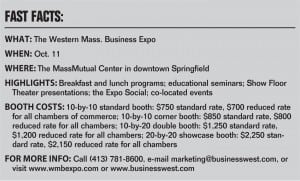 These programs, part of the broader Sales & Marketing category of programs, are good examples of the way in which the Expo is much more than a networking event and opportunity for a company to gain exposure — although those opportunities exist as well, said Kate Campiti, associate publisher of BusinessWest, which will again produce the event.
These programs, part of the broader Sales & Marketing category of programs, are good examples of the way in which the Expo is much more than a networking event and opportunity for a company to gain exposure — although those opportunities exist as well, said Kate Campiti, associate publisher of BusinessWest, which will again produce the event.
“We want to provide attendees with tools, resources, and knowledge that business owners and managers can take back to their offices or plants and put to use the next day,” said Campiti. “That’s why we’ve made educational programs such a big part of the Expo. The expertise offered by our many speakers is one of many ways of providing value to attendees and exhibitors alike.”
The full roster of educational programs will be finalized over the next few weeks, said Campiti, adding that, in addition to Sales & Marketing, other categories will include Management & Leadership and General Business. In addition to the 21 seminars, there will be a number of Show Floor Theater presentations, including a talk by Michael Martin, vice president of Sales for Vibram FiveFingers, who will tell that company’s intriguing story, while also addressing the broader subject of innovation and how one development — such as the FiveFingers product — can lead to a number of growth opportunities for a company.
Details of the Expo are emerging, said Campiti, adding that organizers have been meeting through the spring and summer to finalize programs and fill in a schedule of events that will begin with breakfast at 7:30 a.m. and conclude with the popular Expo Social starting at 4:30 p.m., a get-together that has become one of the more highly anticipated networking events of the year.
Highlights will include more than 180 exhibitors, breakfast and luncheon speakers, presentation of the Better Business Bureau’s Torch Awards, educational seminars and special programs, a Technology Corridor, a Health Care Corridor, and a number of co-located events that will bring more people, energy, and opportunities for doing business to the MassMutual Center.
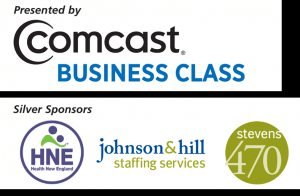 The event is being sponsored by Comcast Business Class (presenting sponsor), and silver sponsors Health New England, Johnson & Hill Staffing Services, and Stevens 470. Additional sponsorships are available.
The event is being sponsored by Comcast Business Class (presenting sponsor), and silver sponsors Health New England, Johnson & Hill Staffing Services, and Stevens 470. Additional sponsorships are available.
Booths are also still available, and can be ordered by calling (413) 781-8600, logging onto www.wmbexpo.com or www.businesswest.com, or e-mailing [email protected].
— George O’Brien
How to Successfully Manage and Minimize Risk
Choosing a business name that will identify your company’s products and services can be an important factor in your ultimate success. A great name is the first step in creating a great brand: it should be memorable and create appropriate mental pictures when heard.But, while choosing a business name may seem easy, this assignment will require some research to ensure it does not lead to what could be costly problems later on.
If you already have an established sole proprietorship and are incorporating, your already-existing good name may lead you to conclude that you should just add ‘Inc.’ However, if you are starting from scratch, naming your business can be more complicated.
Start by brainstorming a list of potential business names. Think about related words or phrases and experiment with combinations of the words you have jotted down. Throw out those that just do not fit, prioritize those remaining, and review those with someone who can provide objective input.
In addition to the creativity involved in choosing a business name, though, there are three main considerations to keep in mind.
Is Your Proposed Name Available?
The secretary of state has records of all active corporations, limited-liability companies, and limited partnerships. Remember, most states do not recognize differences from the use of the word ‘the’ nor in identifiers such as Inc., Co., or Ltd. This means that, if there is already a corporation named Pet Shoppe Inc., you will be prevented from using names such as The Pet Shoppe Inc., The Pet Shoppe Co., or The Pet Shoppe Ltd.
Will the Proposed Name Be Eligible for Trademark Protection?
Obtaining trademark protection helps to prevent another business from using a name that is likely to be confused with yours, which allows consumers to identify your product or service with you and the branding of your business. Conversely, you will want to confirm that you are not infringing on another corporation’s trademark. Receiving a cease-and-desist letter, or being sued for trademark infringement months after you open for business, can be a significant setback.
Is the Proposed Name Available as a Web Domain?
In this day and age, just about every business includes a Web site as part of their business advertising, and you should check to see if your proposed name is available as a domain.
While there is no magic formula, distinctive business names are clever and memorable and, when researched and protected correctly, will be there to remain consistent for years, which will help build trust, goodwill, and loyalty between you and your customers.
Michael S. Gove is an associate with the Springfield-based law firm Cooley, Shrair P.C. He focuses his practice on assisting clients in the areas of corporate/business, banking, and bankruptcy law; (413) 735-8037; [email protected]
South Hadley & Granby Chamber Relies on Support
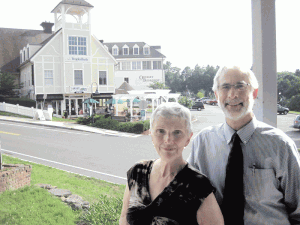
Susan Stockman and Steven Markow say the chamber relies on a support network woven from about 100 mostly small businesses and organizations in the two towns.
“A customer came up to me, called me by name, and said, ‘I need your help; I’ve broken my glasses,’” said Markow, an optometrist and owner of Village Eye Care in South Hadley. “I really like that. It’s just what I love about living and having a business in a small town; my customers can come up to me in the grocery store, and I know them by name, and I can know right away what they need.”
The business community in South Hadley and neighboring Granby is dominated by such small businesses, he went on, noting that, while this constituency certainly contributes to the social fabric of those towns, it creates challenges, as well as opportunities, for the South Hadley & Granby Chamber of Commerce, which he will serve as president beginning in January.
Elaborating, he said that, while the chamber has some larger members — Mount Holyoke College would definitely be in that category — most of the 100 businesses and organizations involved with the chamber would be considered small if not very small. This creates fiscal challenges (dues are set based on overall employment figures) and limitations on overall support for chamber initiatives, he noted, adding that what this chamber lacks in terms of a membership base and large companies, it makes up with imagination, energy, and resourcefulness.
Those were some of the words chosen by the chamber’s part-time executive director and only employee, Susan Stockman, former director of Corporate Communications for Yankee Candle. She said the chamber is able to carry out its broad mission of serving members and promoting the business community through the donations of time, talent, resources, and vision from supporters such as Mount Holyoke and its president, Lynn Pasquerella, who Stockman refers to as “a dynamo.”
“A while back, she opened her home to our members, and it was a highly attended networking event,” Stockman explained. “We have to rely on others in the community to support us in various ways so we can support our members. The police and fire department, South Hadley School Band, and even our small group of volunteers that produce the annual Holiday Stroll [an outdoor winter festival filled with music, shopping discounts, and food in the Village Commons], they all help.”
Markow agreed. “We take advantage of working as a group, and we’ve even gained members who want to help with the Holiday Stroll, which helps to develop our betterment goals for the community.”
For this issue’s Getting Down to Business focus, BusinessWest talked with Stockman and Markow about this support network that has evolved over the years, and how it is integral to the chamber’s efforts to help improve quality of life in South Hadley and Granby.
It Takes A Village
When Stockman retired from Yankee Candle in the fall of 2005, it took less than four months, even through the typically busy holiday season, for her to realize that full days of downtime were not for her.
“I was so bored, I couldn’t stand it,” she told BusinessWest. “But this opportunity came about, and I had a good deal of experience working with the Franklin County Chamber of Commerce, since Yankee Candle was the largest employer in that area.”
Her background in corporate communications at the renowned tourist attraction was a good fit for the town of South Hadley, and since the position was only part-time, skills that included effectively communicating business objectives and working with volunteers through past chamber functions were welcomed, said Stockman.
But the road hasn’t been easy. “We’re very different from every other chamber in the region in that we are not in a tourism area, and that doesn’t offer us any funding sources, like the state funding that Springfield or even the Berkshires receive.”
But Markow adds that what South Hadley lacks in tourism destinations, it makes up for in the nationally recognized college — Mount Holyoke — and the aforementioned high quality of life and atmosphere that both towns offer. While Granby may be more of an agricultural community, it recently became the new home of the MacDuffie School, a highly respected, private, international boarding high school, which relocated from downtown Springfield.
Markow says there are still many businesses in Granby, but those come with what he calls “outreach issues.”
“Granby has plenty of business, but it tends to be home-based, like contractors, electricians, and plumbers — those businesses that are service-related,” he explained. “And with just a part-time executive director and those of us in the chamber who are already very busy running our own businesses, it’s difficult to go out and speak to them about the pluses of being with the chamber.”
Still, membership has held fairly steady in recent years, despite some losses prompted by the Great Recession.
“It’s been a hard time for many, but most of those that we lost are small, one-person businesses or those that had personal or family concerns,” said Stockman, who noted that membership, which was at 125 a few years ago, is now closer to 100. She noted a spate of recent closings or businesses restructurings, mostly in the restaurant industry along the Route 202 corridor. “But already, we see new businesses taking over those spaces — a gourmet deli, for one — and that is encouraging.”
Overall, membership is just one of the areas where the chamber relies on its members and volunteers to help grow membership and otherwise enable the chamber to carry out its mission, said Markow. “It’s as a group that we can make progress.”
Stockman noted that even the small town of Greenfield has a paid official charged with business development. “We are that person for South Hadley and Granby.”
Despite these challenges, the chamber has been able to bring value to members — and help many small businesses mature and grow — by enabling them to make contacts, largely through a host of formal and informal networking events, as well as informational sessions designed to keep them abreast of issues impacting all businesses in the Commonwealth.
“We’ve had a lot of success over the past few years with our Beyond Business monthly events (essentially an after-5 networking event), and we are very flexible with the days, but members do help out.”
She offered a recent example of group-effort support: Chris Brunelle, owner of Brunelle’s Marina, offered the Lady Bea vessel (on which the company provides cruises down the Connecticut River) as the venue for a networking cruise event on August 28, which will keep the cost of the event down for members.
School Is in Session
Stockman is also preparing for a special Beyond Business at the Old Firehouse Museum in September that will honor premier members. But aside from the networking and recognition, Stockman said there are two standout events in the chamber’s educational program: an annual legislative breakfast, which offers members an update on the political landscape from state Rep. John Sciback and state Sen. Stan Rosenberg (who missed this past spring’s event due to cancer treatments); and the annual Economic Forum, now in its sixth year, which features Mount Holyoke College Professor James Hartley.
“The Economic Forum is especially well-received due to Jim Hartley, who heads the department of Economics and, in fact, was recently named as one of the best 300 professors in the nation by the Princeton Review,” Stockman told BusinessWest.
Indeed, that book, The Best 300 Professors, compiled by the well-regarded Princeton Review, lists no less than 14 Mount Holyoke College professors, more than any college in the Commonwealth listed in that publication.
It is through this high caliber of talent within the South Hadley and Granby area, Markow noted — not just from the large businesses like Mount Holyoke College, but from enterprises of all sizes — that the chamber is able to pool support that helps to educate and better the business and personal lives of those in the area, even if they aren’t chamber members.
“I’m really proud of the quality of life in this community,” he said. “We’re working to make both towns a more attractive place to live and work.”
As a final example, Markow mentioned that, even though he doesn’t own a dog, he suggested that the chamber help make possible the creation of a dog park, a concept he says is becoming increasingly popular in towns across the nation, and certainly a act of ‘betterment’ in the community.
“Dogs these days, with all the town policies, rarely have a chance to be off-leash, and while we can’t take this all on ourselves, we’ll help to facilitate and get it going,” he said.
While every program, initiative, or event isn’t exactly a walk in the park, so to speak, Stockman says each effort — small or large and usually group-oriented — is just one more step in the right direction for the chamber and the communities it serves.
Elizabeth Taras can be reached at [email protected]
And How Can I Get My Ex to Help Cover These Expenses?
If you divorced your ex-spouse when your kids were young, it is possible that you did not consider the funding of your children’s college education in your support order. Now that they are on the brink of college, you may be looking ahead to that considerable financial hurdle and wondering how you will be able to pay for it, and how to ask your ex-spouse to contribute their fair share. You may also be wondering how college will affect existing child-support payments.Separation agreements and divorce judgments often don’t make a specific provision for how children’s college education will be funded, what percentage of the total cost each parent will pay, and what happens to weekly child-support payments as a result, which is entirely distinguishable from college contributions.
Instead, what is most commonly seen is ‘blanket language.’ That’s the language in an agreement or order that says child support is to be paid until a child is deemed emancipated, and once each child reaches the age of college, both parents will attempt to discuss with each other how college will be paid. They also agree to discuss which college each child will attend, given their aptitudes and desires. Parents also have an understanding that they must exchange financial information and cooperate with their child’s financial-aid office. Unfortunately, such blanket language often leaves parents confused as to what the nexus should be between their weekly child-support order and each parent’s college-contribution percentage.
Reaching that perfect balance between a weekly support order and college contribution can be tricky at best. Most parents paying weekly child-support orders pursuant to the child-support guidelines can’t pay both and don’t feel that they should have to. If there have been some college funds or accounts set aside to assist paying parents, an agreement or order should dictate whether those accounts are to be utilized prior to either parent contributing out of pocket, or whether the funds within the accounts are actually a part of the contribution that a parent will be required to make.
In the case where there is no fund set aside, and a parent is now being asked to pay both a weekly support amount and contribute to college, the typical paying parent begins to feel as though their weekly support is more like alimony. They fear that they are being set up for exactly that: a request for alimony once child support is over, creating a never-ending stream of payments to a spouse they haven’t been married to for years.
The best time to discuss how to pay for college and how this affects a weekly support order is certainly not when the first tuition payment is due, but the September of that child’s senior year of high school. By then, you probably know whether your child is going to apply to a community college, a state university, Harvard (or its cost equivalent), or something in between. This gives you a feeling for what the tuition will be, whether financial aid is necessary, and how much input each parent will or wants to have in the college-selection process.
If there is a required mediation clause in the parties’ agreement or judgment, then arguably you and your ex-spouse can wait until your child’s actual acceptance is received from the institution. But be careful not to set your child’s expectations too high if you know there is simply no way to afford a $40,000-per-year tuition bill even with loans. Being practical, reasonable, and knowledgeable of the law is the key to successful negotiations in this regard.
If you and your ex-spouse can’t work out how much each should contribute, what should happen to weekly child-support payments, whether to use any college savings or investment accounts first or last, and whether to require your child to apply for student loans, scholarships, and grants without court intervention, a modification action should be filed about eight to 10 months prior to the child’s entrance to college to allow adequate time for financial discovery. During this period, you and your ex-spouse may reach resolution, but in the event that you cannot, there is enough time to have a trial on the merits and receive the judge’s decision.
The statute governing periodic payments of child support from one parent to another provides that, between the ages of 18 and 21, a court can award child support if a child principally resides with the custodial parent and is principally dependent upon them for support, without any requirement that a child be attending college. Between the ages of 21 and 23, a court can still award child support if a child continues to principally reside and be dependent upon the custodial parent, but they must be pursuing further education, not to exceed a bachelors’ degree.
Because there is no ‘bright-line’ rule for how judges must treat weekly support orders if a parent is also ordered to contribute to college, this opens up myriad possibilities and differing judicial decisions. It should also be noted that the actual child-support guidelines are merely discretionary and arguably do not apply after a child reaches the age of 18.
Often, practitioners will run the guidelines for children over the age of 18 anyway to give the judge a suggestion of what could be and to perform an analysis of what some combination of weekly support payments and direct college contribution would look like, in an attempt to figure out how much extra the paying parent should be asked to contribute.
That said, the resulting possibilities are endless. Some judges use the ‘1/3, 1/3, 1/3’ approach, making the parents and the child each responsible for contributing one-third of the total, whether by loans or cash equivalent. Other possibilities include:
• A straight contribution to college, only if the child will spend approximately equal time living with each parent when home from school, with termination of the weekly support order;
• An order of straight continued weekly child support to the custodial parent if the other parent doesn’t have much contact with the child;
• A combination of reduced weekly support and a percentage of college funding, depending on whether the child will live at home and the ability of a parent to pay; or even
• Both continued weekly payments plus a substantial college contribution.
The above options will all be dependent upon additional factors, including whether there are remaining non-college-age children still in the home, the non-custodial parent’s ability to pay, and the custodial parent’s inability to contribute.
Any way it’s looked at, the message is clear. Absent an agreement, and given the amount of judicial discretion present, it is imperative that a parent facing this battle have a skilled lawyer in their corner who can advocate all the intricacies in order to best suit the needs of the child without breaking the bank of one or both parents or causing an undue burden on one parent because the other refuses to provide an adequate financial contribution to their child’s higher education.
Melissa R. Gillis, Esq. is an attorney with Bacon Wilson, P.C. in the domestic, special education, and real estate departments; (413) 781-0560; baconwilson.com/attorneys/gillis
Massachusetts Chamber Business Summit
Sept. 9-11: The Massachusetts Chamber board of directors will conduct its annual Business Summit and Awards Ceremony at the Resort and Conference Center at Hyannis. The two-day meeting allows participants to meet with business professionals from across the state, as well as listen to state and local elected officials who will discuss the future of business in Massachusetts. Additionally, representatives from the Mass. Office of Economic Development will discuss loans, grants, and tax incentives available to business owners. Industry experts will also be on hand to discuss topics such as leveraging social media, search-engine optimization, and health care cost containment. The winners of the Business of the Year Award and the Employer of Choice Award will also be announced during the summit. For more information, call (617) 512-9667 or visit www.masscbi.com.
The Big E
Sept. 14-30: From live music and parades to sea lions and a circus, there’s something for everyone at the Big E. Country music artist Rodney Atkins will play a concert at the outdoor Comcast Arena Stage on Sept. 23 at 7:30 p.m. The Big E’s Mardi Gras Parade returns to the fair with eight custom-made floats specially designed and built by the Kern Companies of New Orleans. The Big E Super Circus features aerial daredevils the Marinofs, the wonder dogs of David Rosaire’s Perky Pekes, the equilibristic ability of Dany Daniels and Edina, comedy, and more. In addition, the Big E will feature a show with the Peking Acrobats, horse shows, the U.S. Freestyle Motocross National Championship series, hypnotist Catherine Hickland, the Sea Lion Splash show, and much more. Look for details and show times at www.thebige.com. Gates open each day at 8 a.m., and building exhibits are open 10 a.m. to 10 p.m. The Avenue of States is open 10 a.m. to 9 p.m., Storrowton Village is open 10 a.m. to 9 p.m., Craft Common is open 10 a.m. to 10 p.m., and the Midway is open Sunday through Friday, 11 a.m. to 10 p.m., and Saturdays, 10 a.m. to 11 p.m.
World Affairs Council Annual Meeting
Oct. 10: Hampshire College President Jonathan Lash will speak at the World Affairs Council of Western Mass. Annual Meeting & Dinner in the Mahogany Room of the Springfield Sheraton Hotel in downtown Springfield. More details will be forthcoming. Lash is an internationally recognized expert on practical solutions to global sustainability and development challenges. Before he became president of Hampshire College in 2011, he served as president of World Resources Institute (WRI), an environmental think tank with offices in eight countries and partners in more than 50 countries. WRI is an international leader on issues ranging from low-carbon development to sustainable transportation. From 1993 to 1999, Lash was co-chair of the President’s Council on Sustainable Development, a group of government, business, labor, civil-rights, and environmental leaders appointed by Bill Clinton that developed visionary recommendations for strategies to promote sustainable development. He played a key role in the creation and success of the U.S. Climate Action Partnership, which in 2007 issued the highly influential “Call to Action” on global warming. Prior to WRI, Lash held posts as director of Vermont Law School’s Environmental Law Center, Vermont secretary of Natural Resources, and Vermont commissioner of Environmental Conservation, as well as a federal prosecutor. For more information on the event, call (413) 733-0110.
Western Mass.
Business Expo
Oct. 11: BusinessWest will again present the Western Mass. Business Expo. The event, which made its debut last fall at the MassMutual Center in downtown Springfield, will feature more than 180 exhibitors, seminars, special presentations, breakfast and lunch programs, and the year’s most extensive networking opportunity. Comcast Business Class will again be the presenting sponsor of the event. Details, including breakfast and lunch agendas, seminar topics, and featured speakers, will be printed in the pages of BusinessWest over the coming months. For more information or to purchase a booth, call (413) 781-8600, e-mail [email protected], or visit www.wmbexpo.com.
40 Under Forty Reunion
Nov. 8: BusinessWest will stage a reunion featuring the first six classes of its 40 Under Forty program. Details on the event will be forthcoming. What is known is that it will be staged at the Log Cabin Banquet & Meeting House in Holyoke, and will be open only to 40 Under Forty winners, sponsors, and their guests, as well as judges of the first six contests. For more information on the event, call (413) 781-8600, or e-mail [email protected].



